“From January 31st to February 16th 2022”
Likoma, this treasure in the middle of the lake Malawi
Likoma is an island of 14,000 inhabitants in the east of Lake Malawi, close to the coast of Mozambique. It is accessible cheaply by ferry, the Ilala. As explained in the previous article this is a large local boat, not brand new, which goes to Likoma from Nkhata Bay once a week on its journey across Lake Malawi.
We arrive with Louis and Delphine (@horizon toubor) at the pier late Monday, loaded with our luggage, camping gear and kayak. The departure is scheduled in 1h15 for 8pm and the activity is intense. At the dock, motorbikes, cars and carts are overflowing with goods to be loaded into the boat. Sacks of rice and corn, bananas, eggs, goats, everything goes.
Once on board, together with an Italian, we are the only tourists on the crowded ship. It is difficult to find our way through the merchandise and the people sitting on the floor in the narrow corridors of the ship. We discover the room reserved for the second class tickets we have purchased. It is a small room furnished with tables and benches. It is very hot inside. Here again, the room is overflowing with goods and people. In other words, it is more than full. We won’t fit in here with our luggage. Louis and I set off to find a place to spend the night and the 9 hours of crossing. We quickly understand that the whole ship is very full. The Italian advises us to go up to the upper deck where we find a small corner to settle behind the stairs. This is where we spend the night, curled up on our camping mattresses which are themselves folded in half. The rain soon arrives. The deck empties out and the passengers compact even more in the lower levels. Fortunately, we have our tarp to protect us and stay up there to sleep.
For dinner we found some comfort in the ship’s restaurant which was surprisingly empty despite the very affordable prices.
After a short night, a little wet on the deck, we arrive at our destination around 4:30 am. There is no harbour, so disembarkation is done on small boats that go back and forth to the beach.


It’s a rush! Everyone pushes each other to get on the small boats in the middle of the many bags of provisions. Some even climb down the bars of the boat to get a place before the others. What a commotion early in the morning!

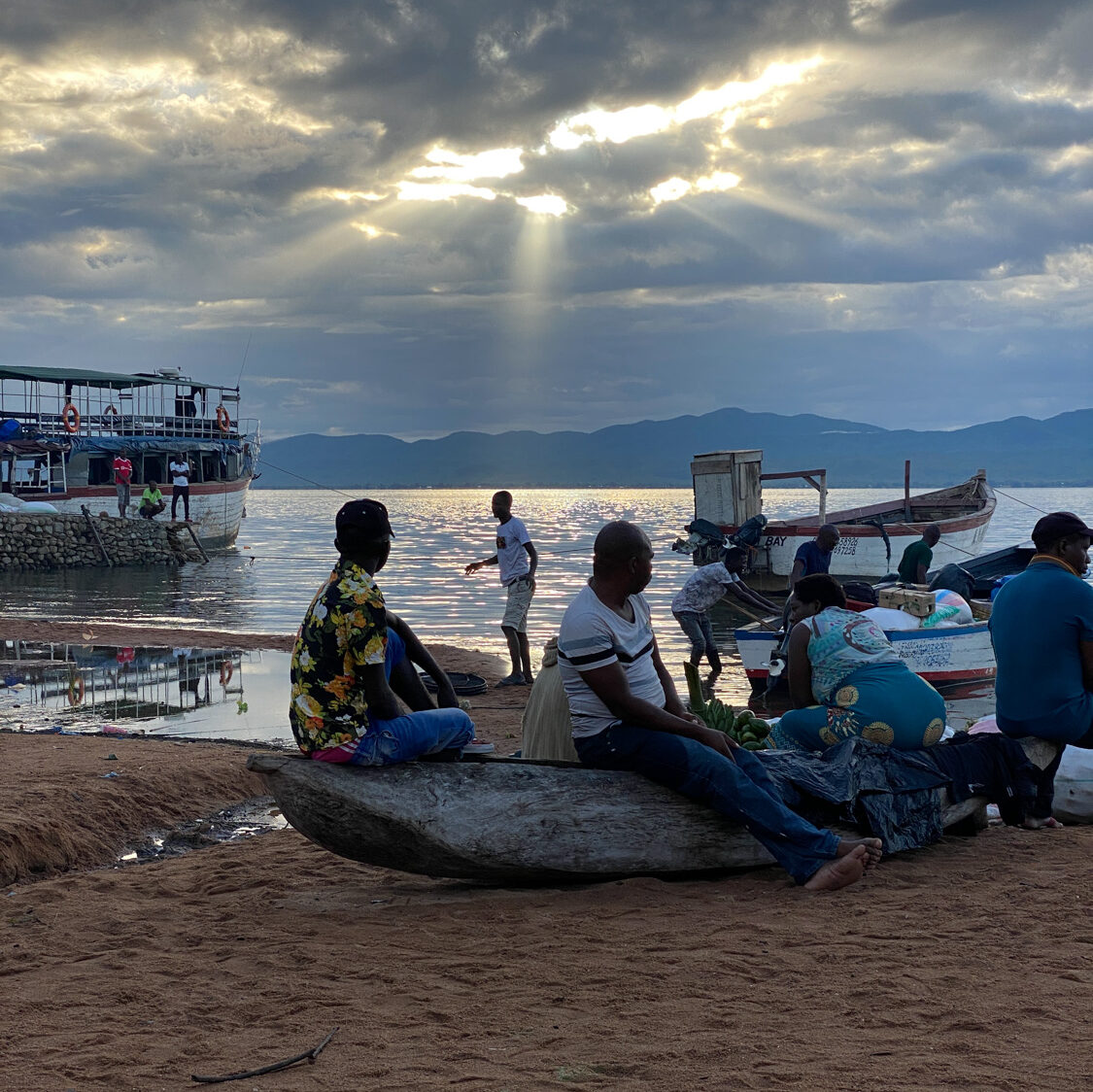
We arrive on a small sandy beach. It is very early in the morning and yet the whole village is already up waiting for the goods that arrive with the boat.
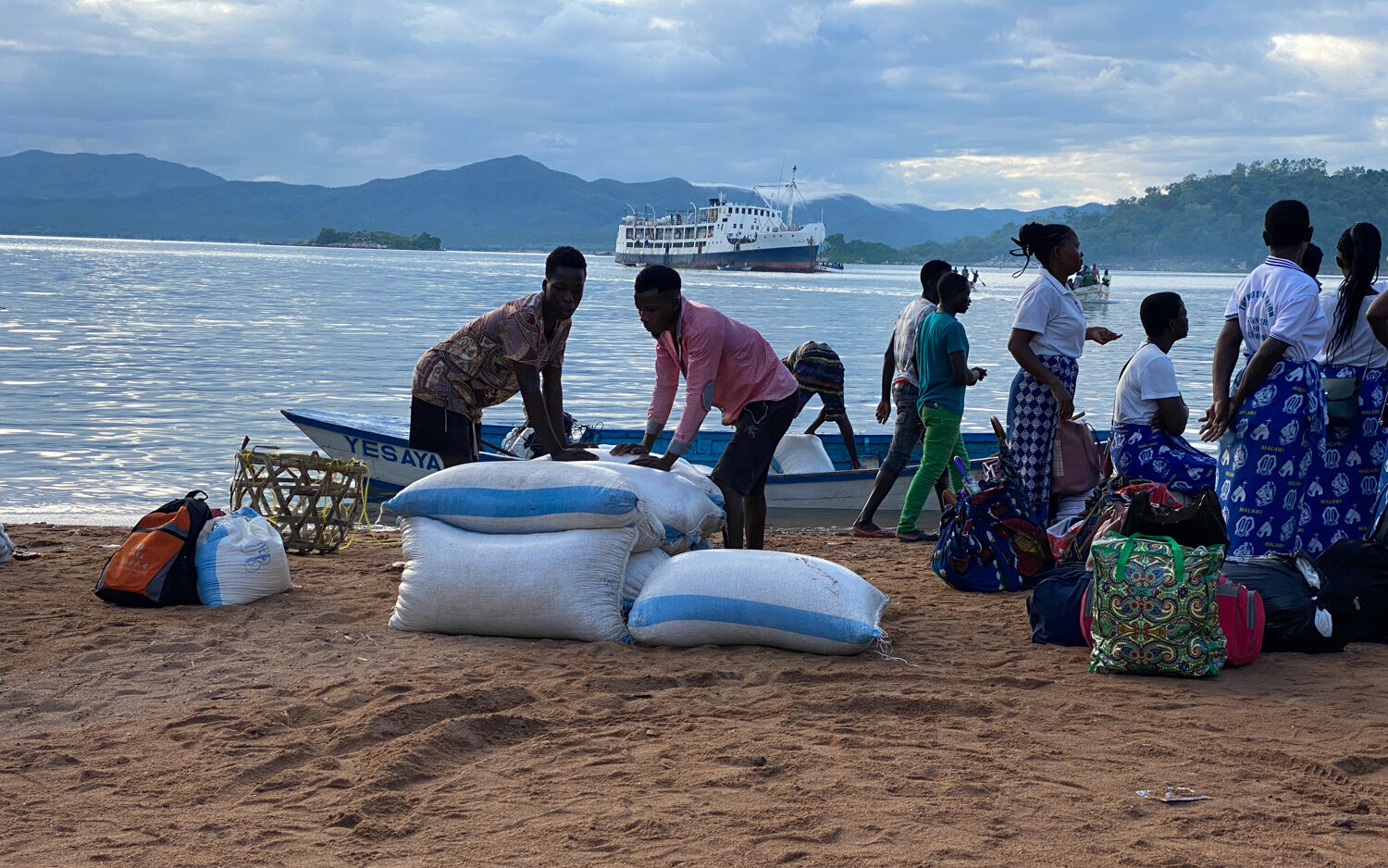
To install our tents, we have a choice of two reasonably priced campsites. One is in the north of the island, the other in the south, both a 45 minute walk from the beach which acts as a port. We opt for Ulisa bay, the owner being more welcoming on the phone. We are still loaded. A small pickup truck takes us on a chaotic 3.6km road. Sitting in the skip, we could describe this short trip as a “kick ass”.
On arrival, Chris, the owner, welcomes us. He is open to negotiation and offers us a chalet for 4 people at only 1€ more per person than the campsite. We quickly accept, especially as the weather is uncertain. The chalet is slightly elevated, set on a small hill overlooking the lake. Below, the terrace of the bar-restaurant on stilts is as close to the water as possible. To its left, a sandy beach invites us to swim in the clear water of the lake.
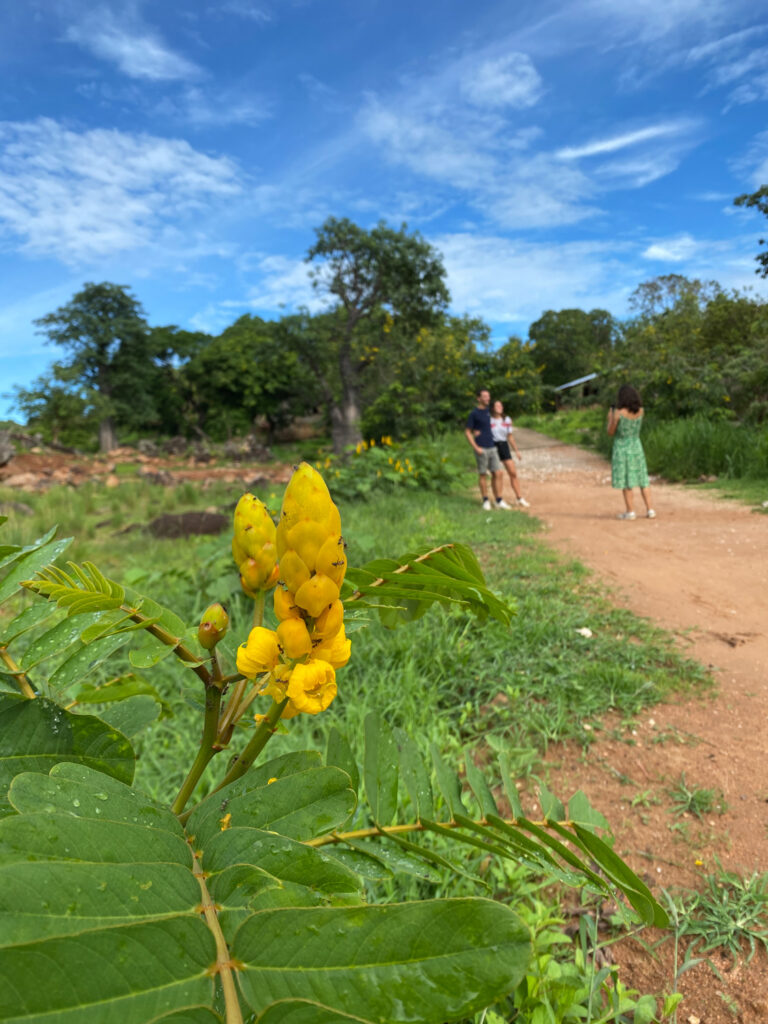

It is also the starting point for many excursions with our kayak. The first one accompanied by Delphine and Louis who rented a boat with paddles for the day. We go along the coast towards the south. The water is calm and of a resplendent blue contrasting with the green coast of wild shrubs and baobabs growing between the rocks. We reach the beach and the bar at Mango drift camp. We sit in a huge comfortable sofa made from an old fisherman’s boat.
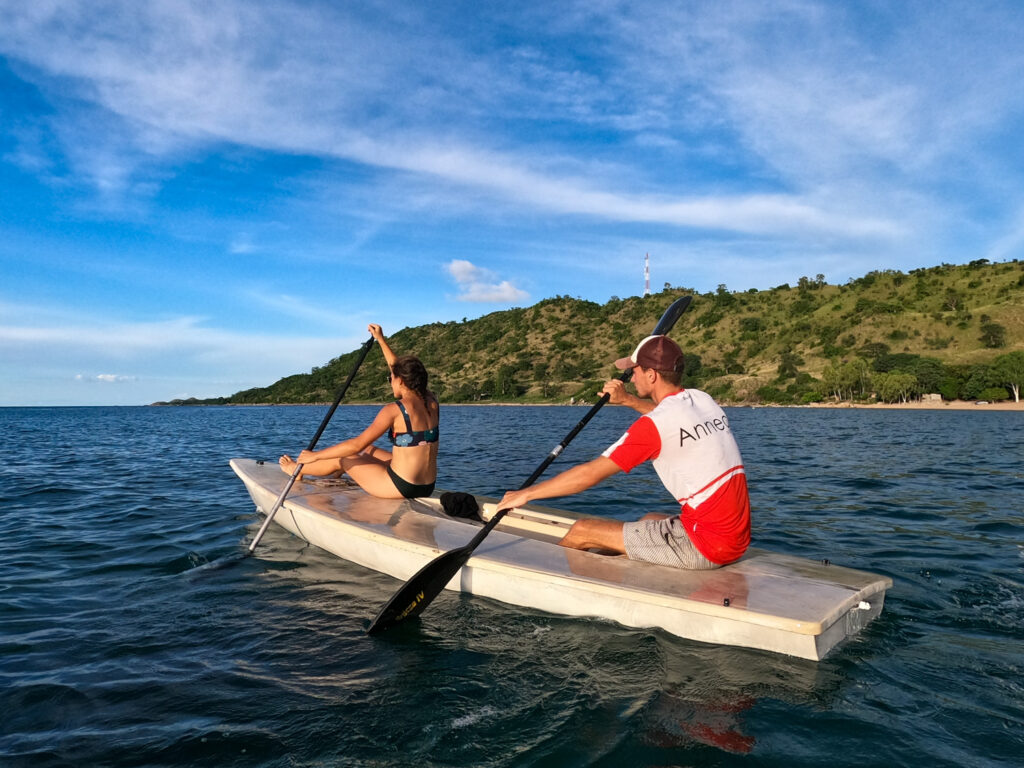
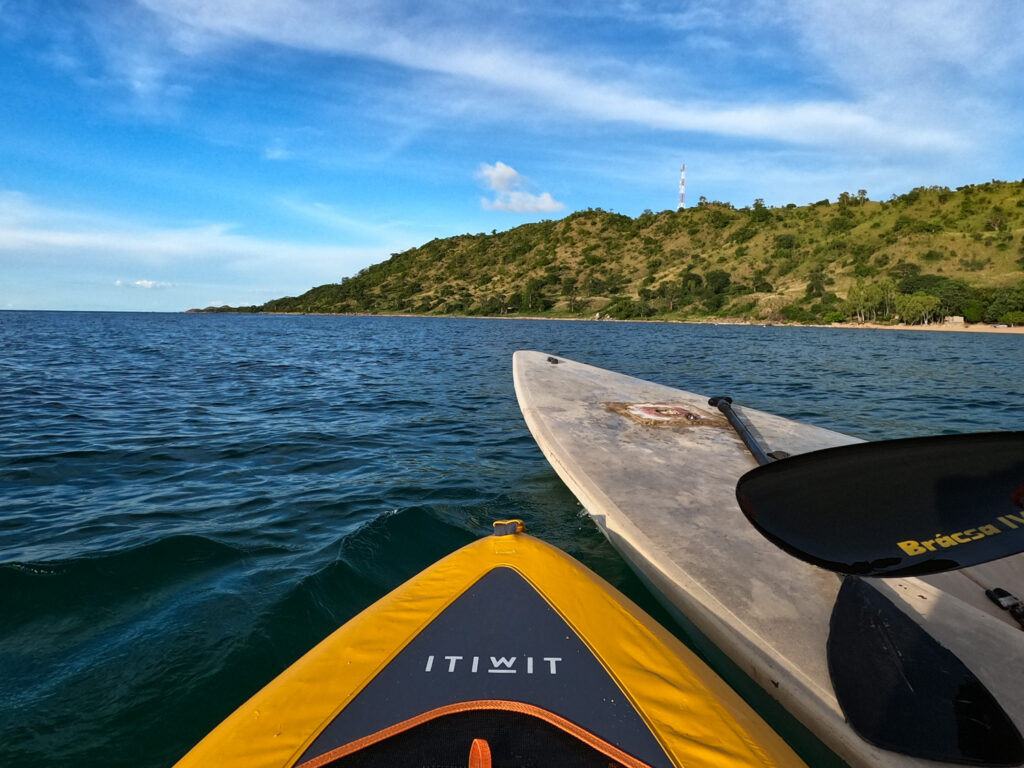
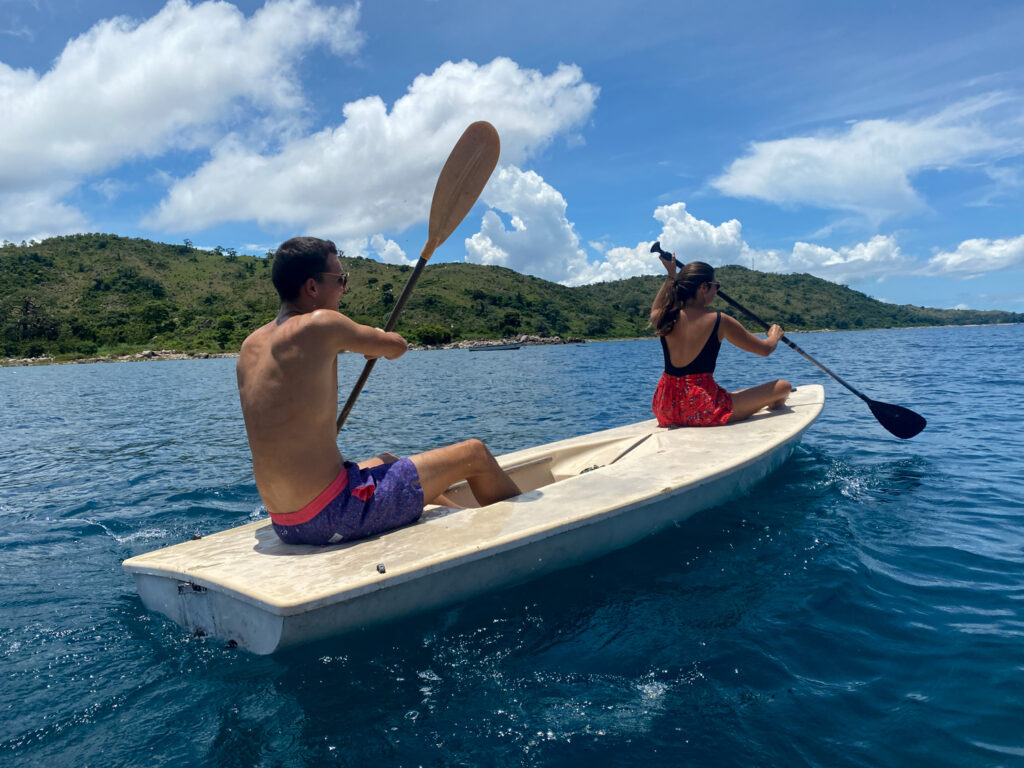
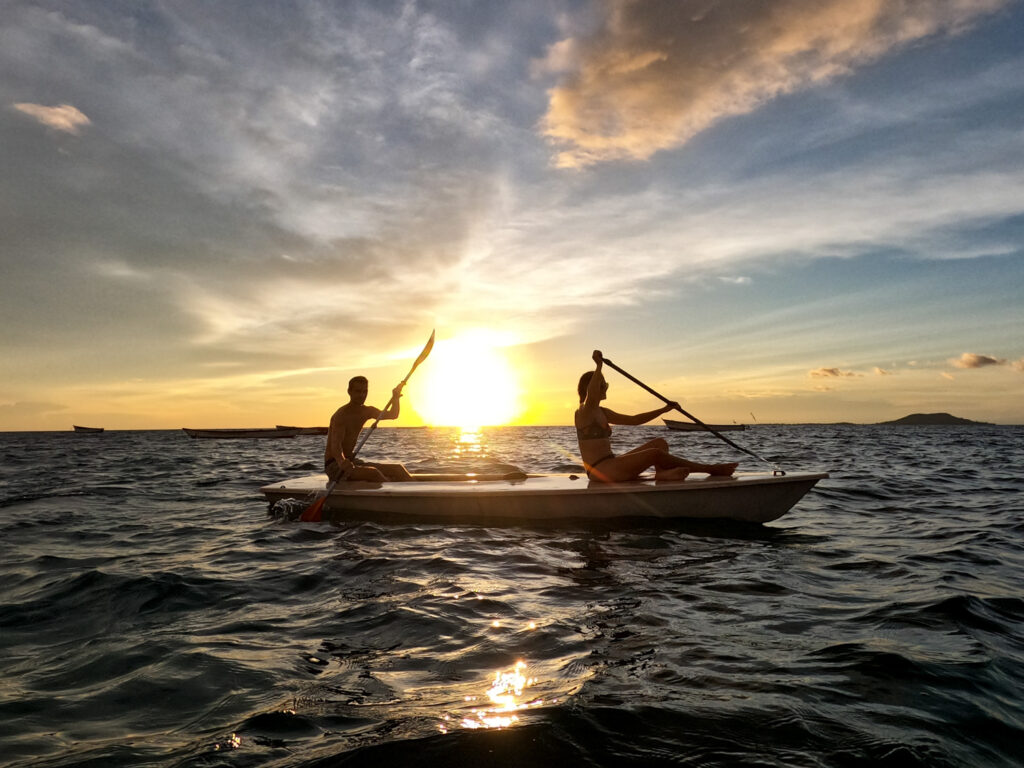
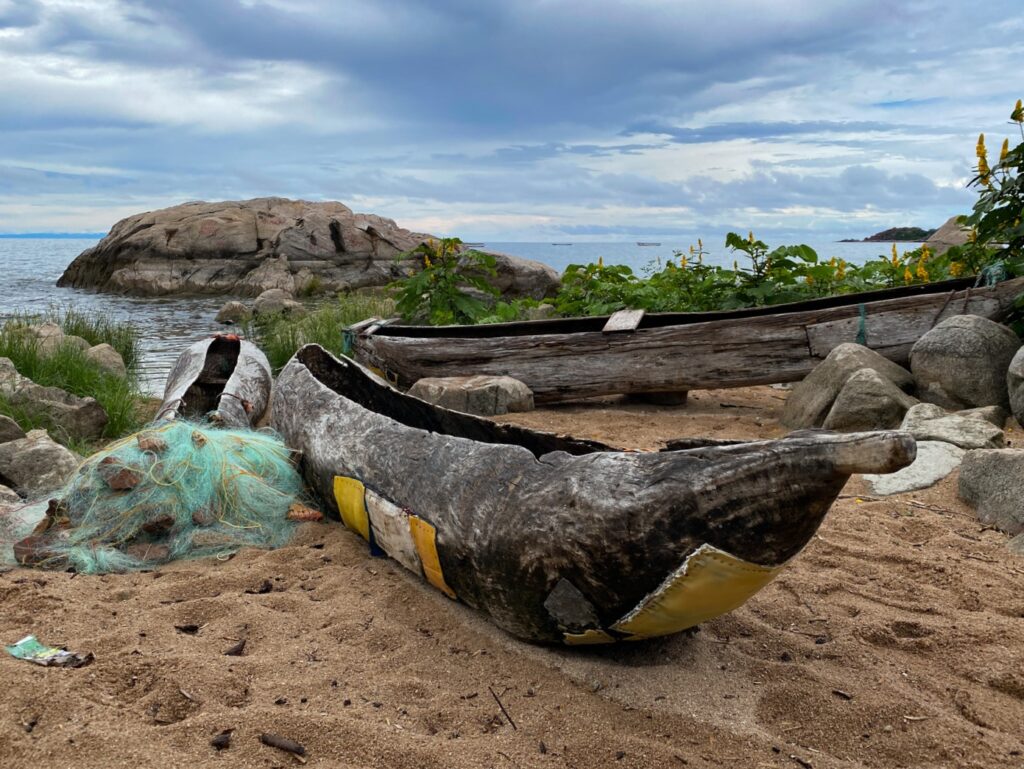
Life on the island is a quieter version of life in the Malawian metropolis. Here everyone knows each other, or almost everyone. The locals, happy to receive visitors, are friendly. The children come running to say hello and shout Mzungu as we pass. It is a term that means white but without any pejorative connotation. We are “most welcome” and invited to feel at home. Thus, we mix with the population. Tonight we go to the only bar on the island that overlooks the beach. On the way, we stop in front of the island’s cathedral. Built in stone, its large façade is just as impressive as its green cloister. Closed this day, we will have the chance to visit it on Saturday under the explanations of Benjamin. This young father born on the island was happy to share his knowledge.
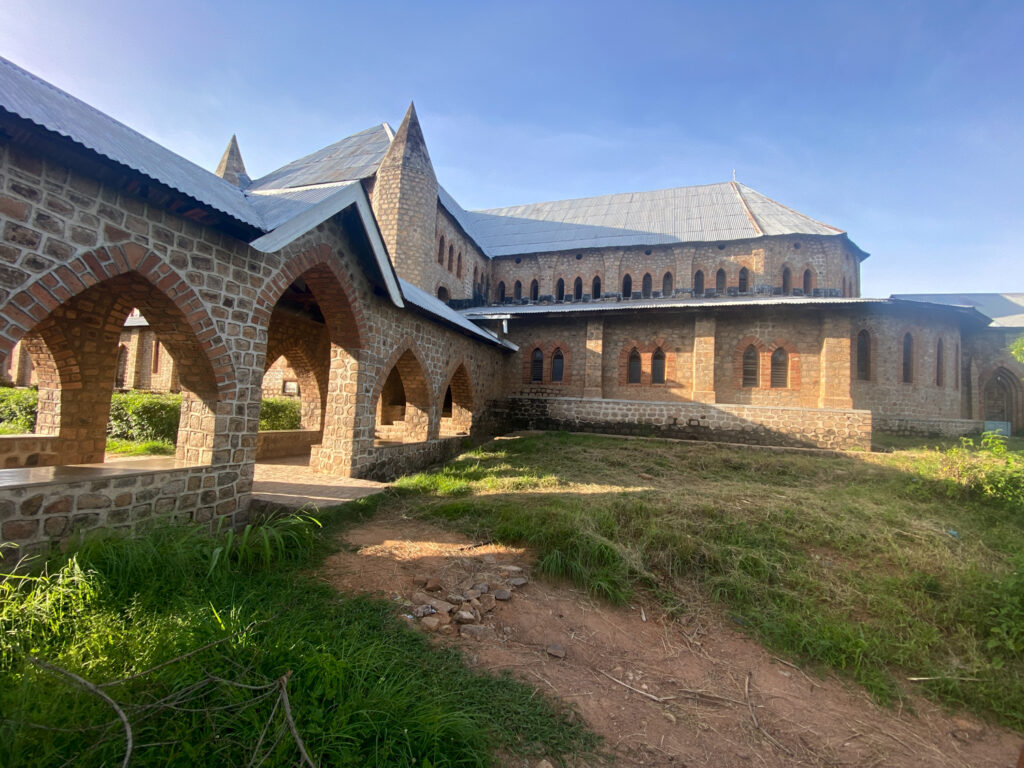
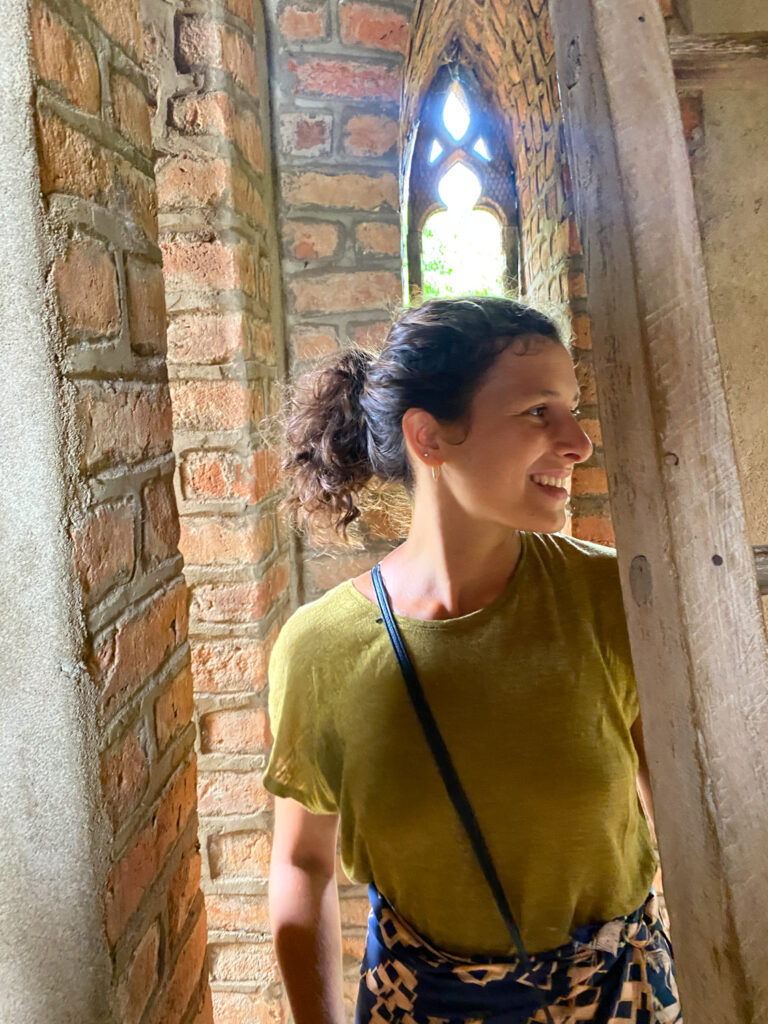
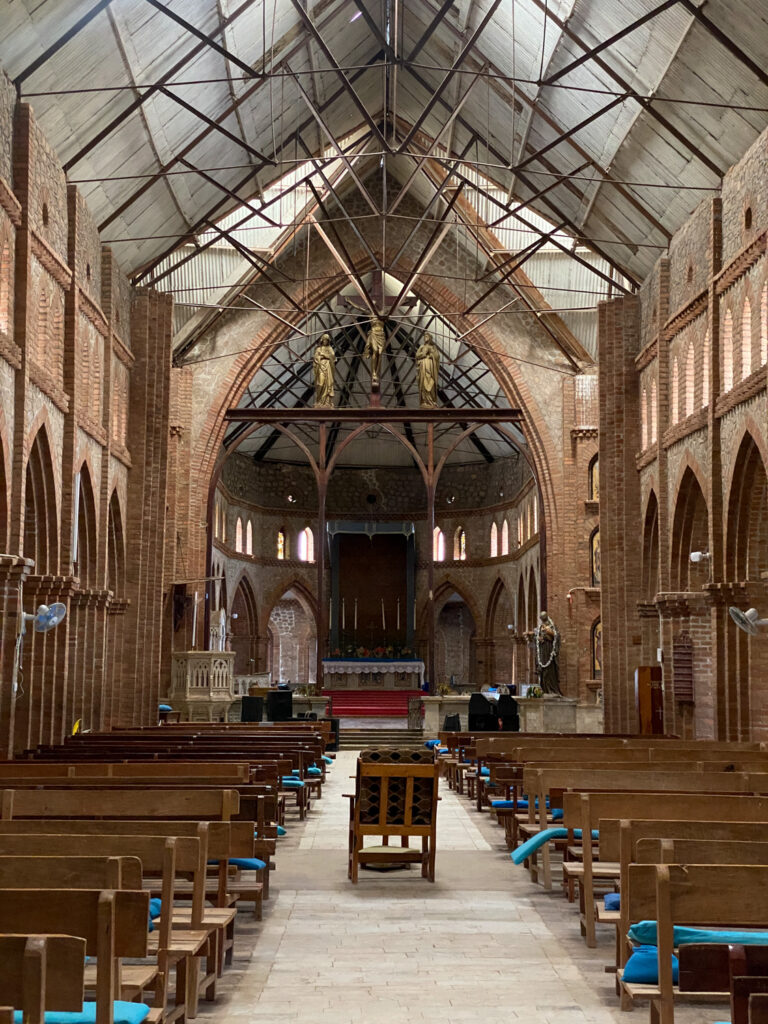
Once at the bar, we sit down facing the beach. Children play in the sand, men drink and some couples dance to the crackling music from the bar’s speakers. At nightfall, this is also where the fishermen leave for a night of work.
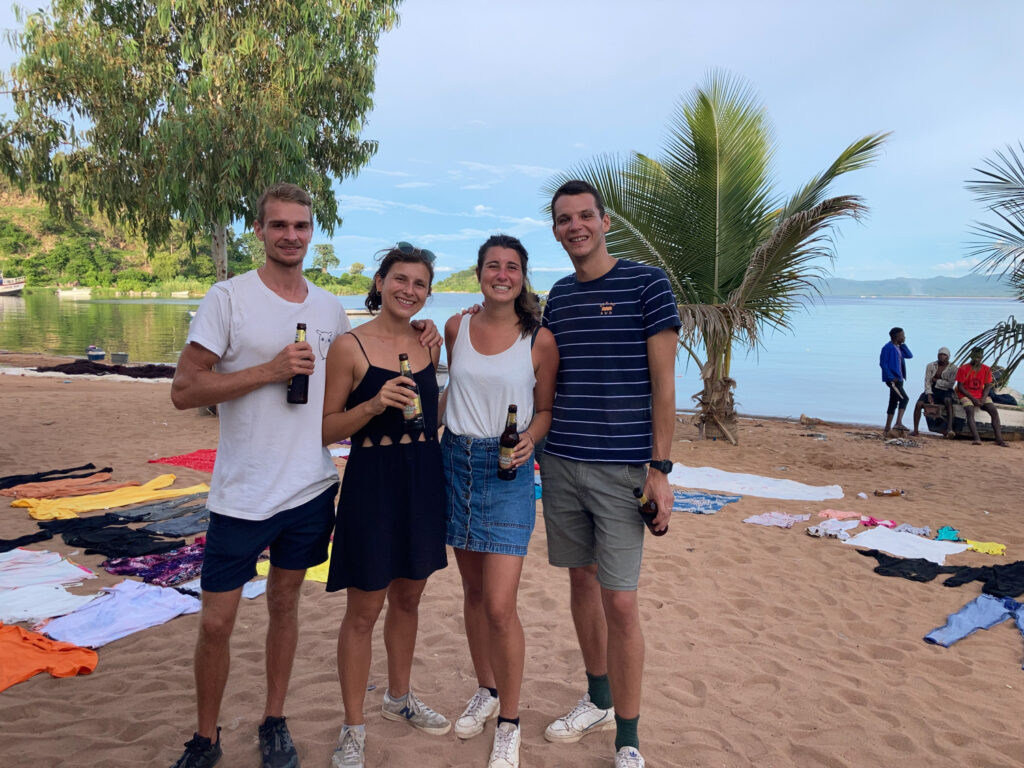
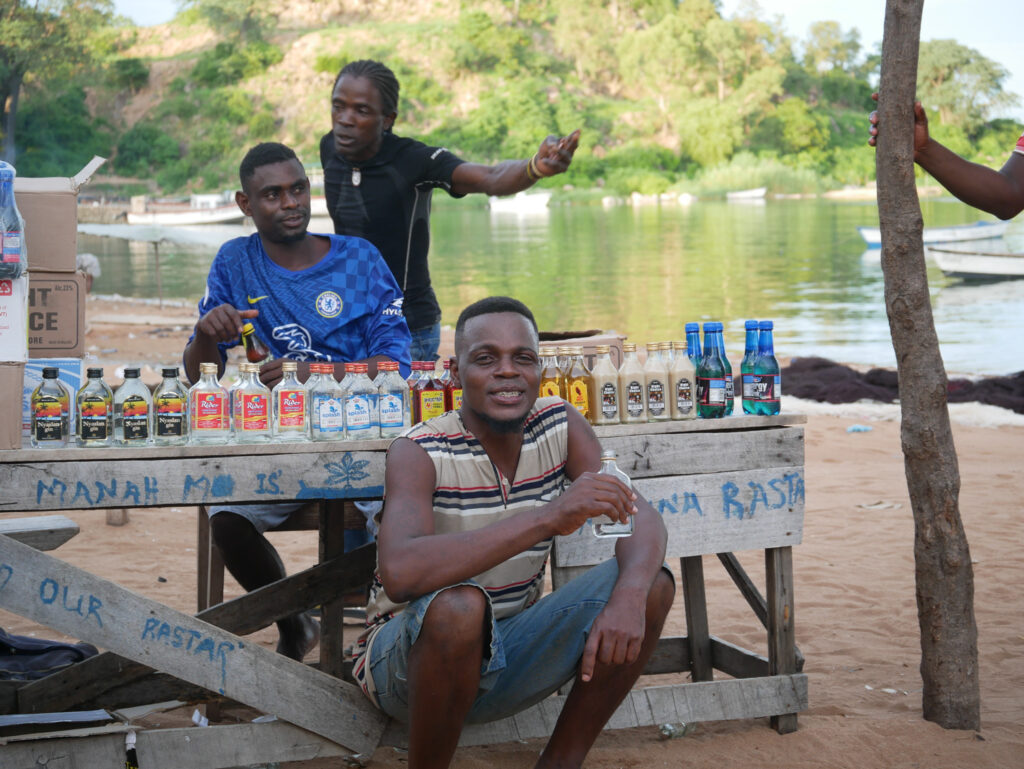
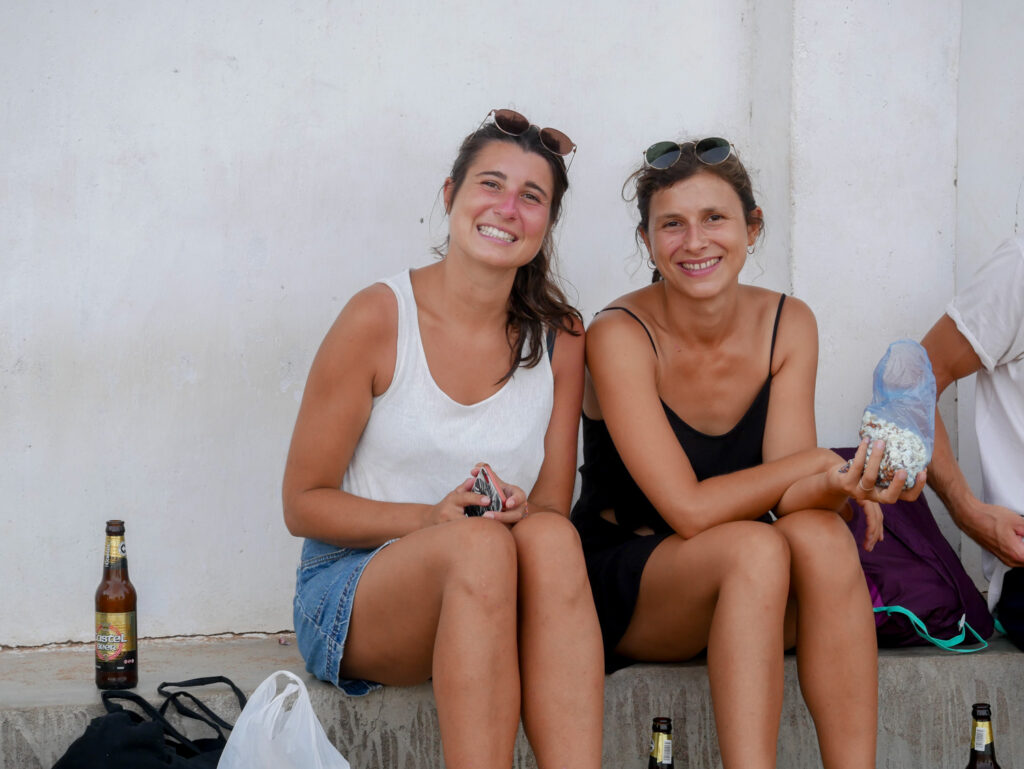
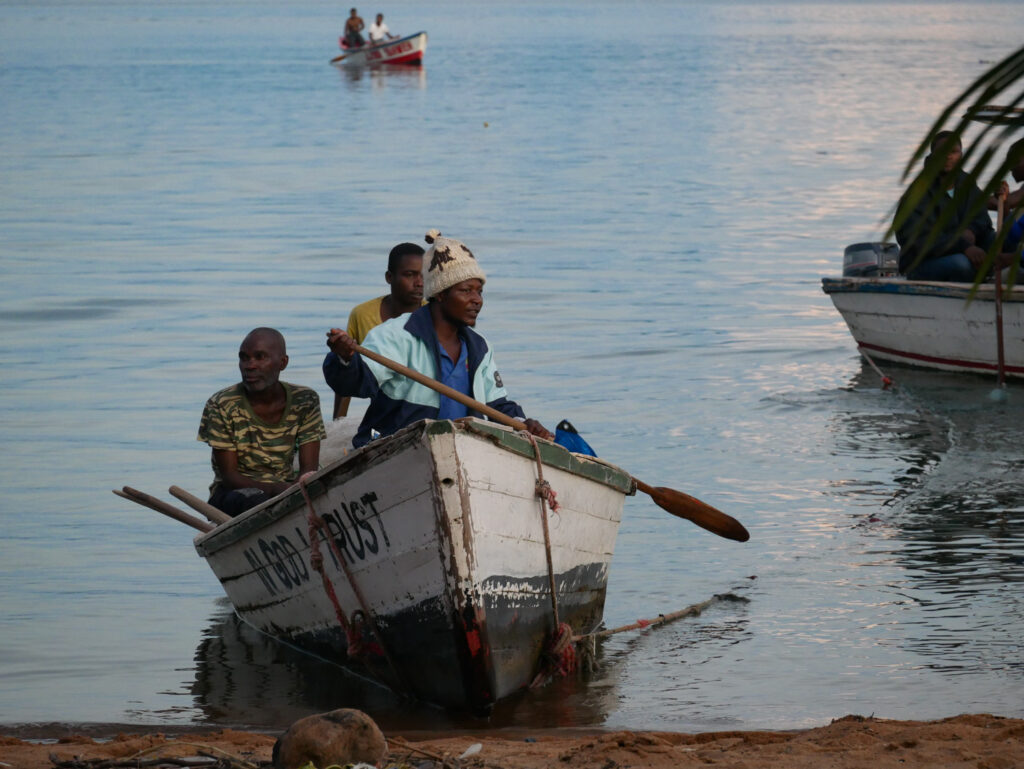
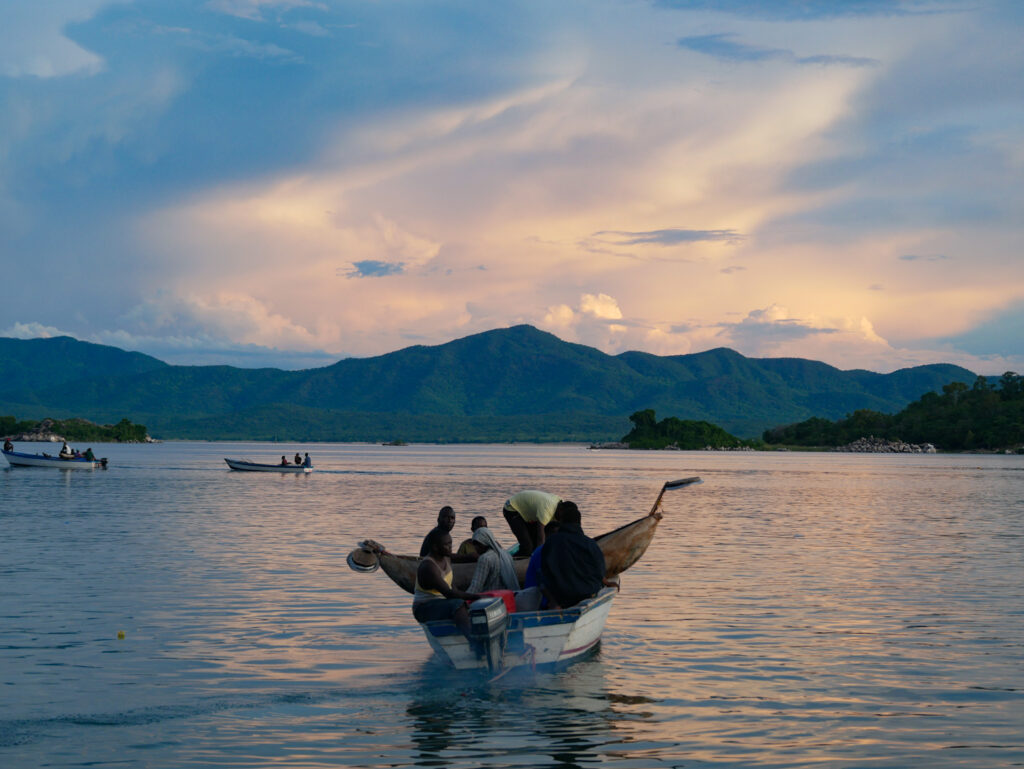
We spend 5 days on the island, before taking the Ilala back on Saturday afternoon.
Valentin takes the opportunity to do more kayaking. On the beach, curious children swim towards the returning kayak. Respectful, they keep their distance. I invite them to come and have a closer look, to be pulled behind the kayak, to try it out and to get on board with me to go faster. As their smiles and laughter show, they love it. When I signal to them that I am going to eat, they help me put the kayak away and remove the sand. They are very proud to pose for a photo together.
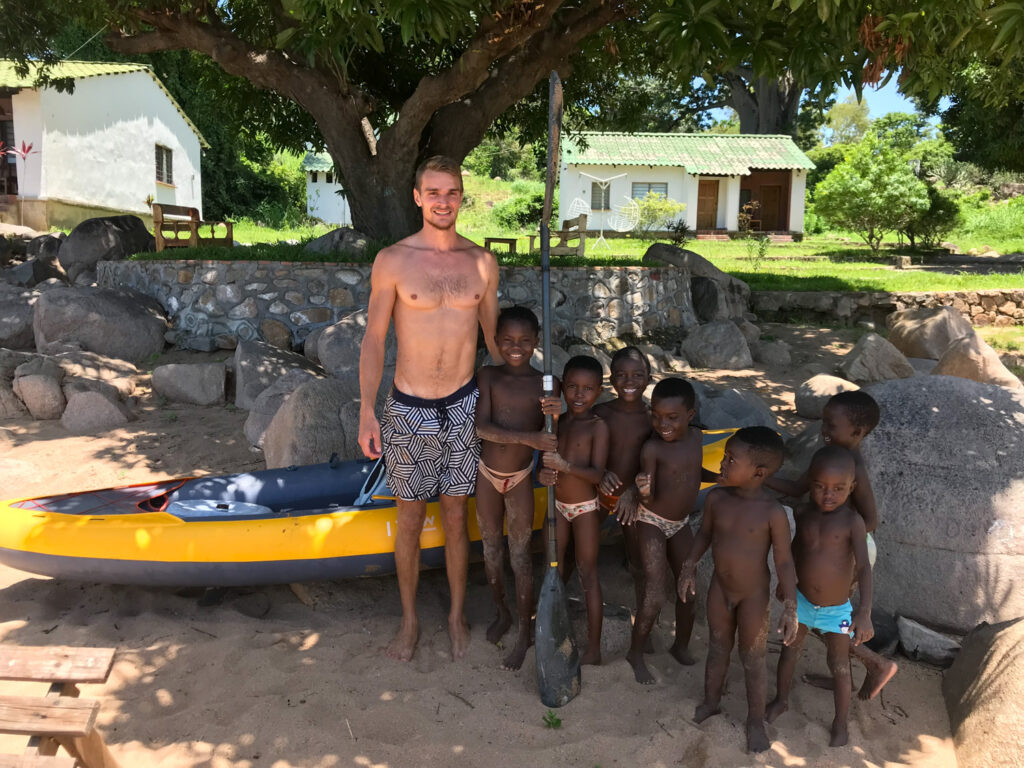
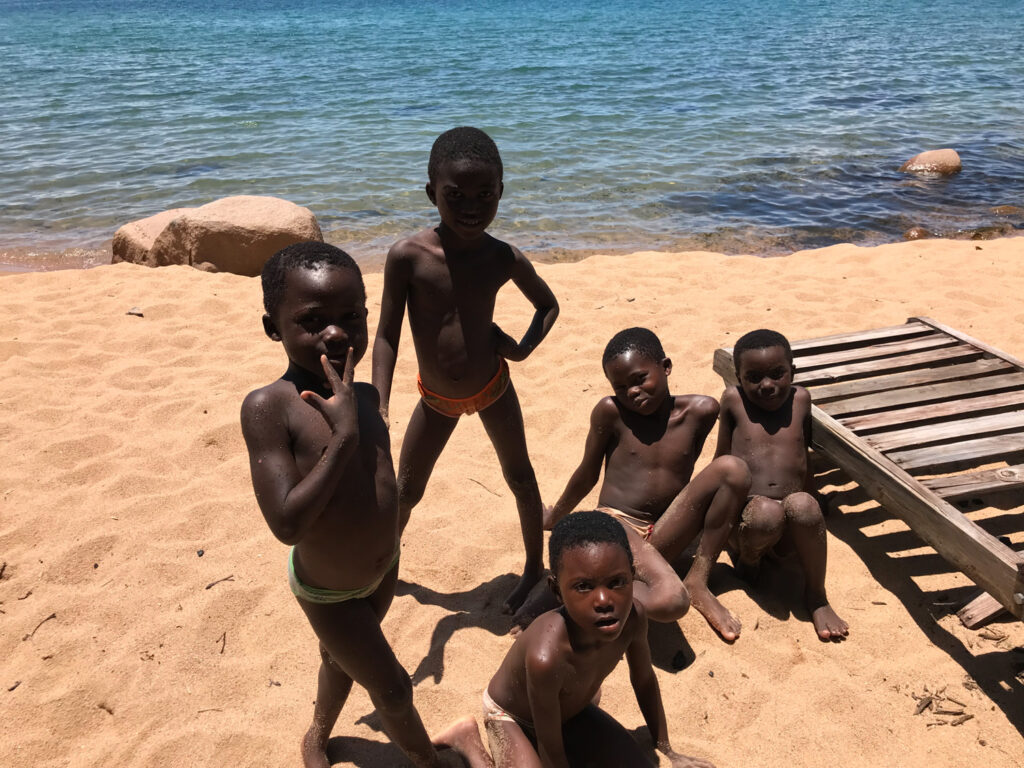
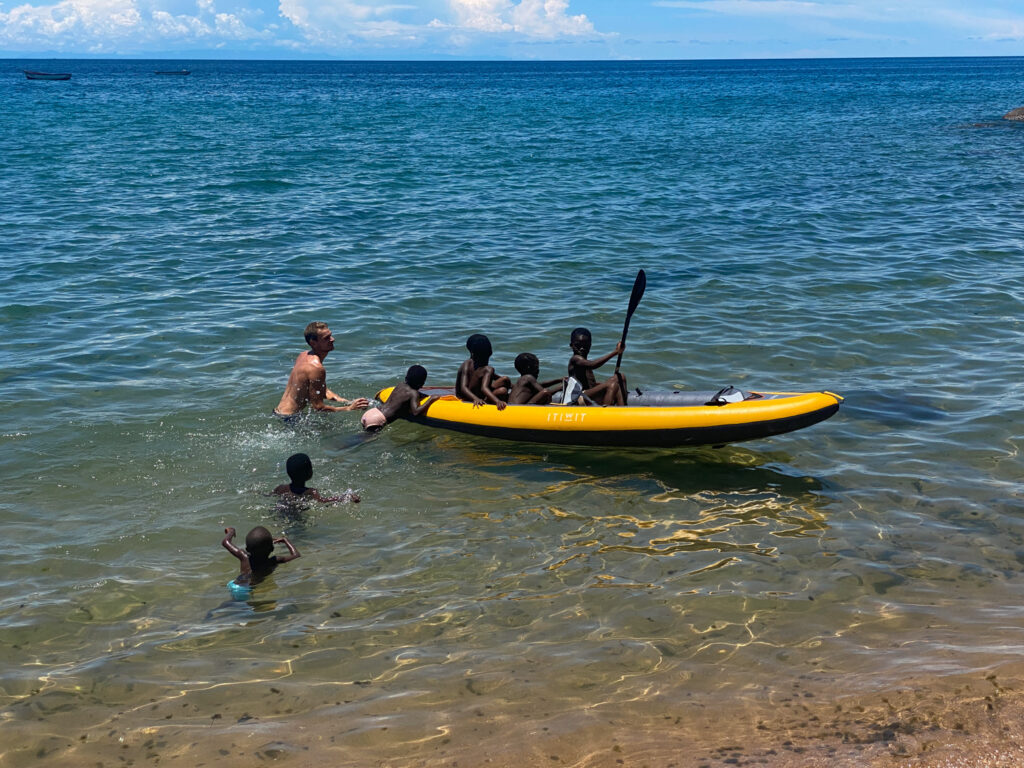
On the last evening, accompanied by Delphine and Louis, we embark with four fishermen from the next village. Our goal is to bring back enough fish for tonight’s dinner. We embark in a large wooden boat, built on the island. Valentin naturally takes a paddle to propel the boat in rhythm with the fishermen. Fishing is usually done with nets at night and takes long hours. In our case, for a 2 hour trip until sunset, we fish with a line. We share 3 lines, each with 3 to 4 hooks on the end followed by a weight.

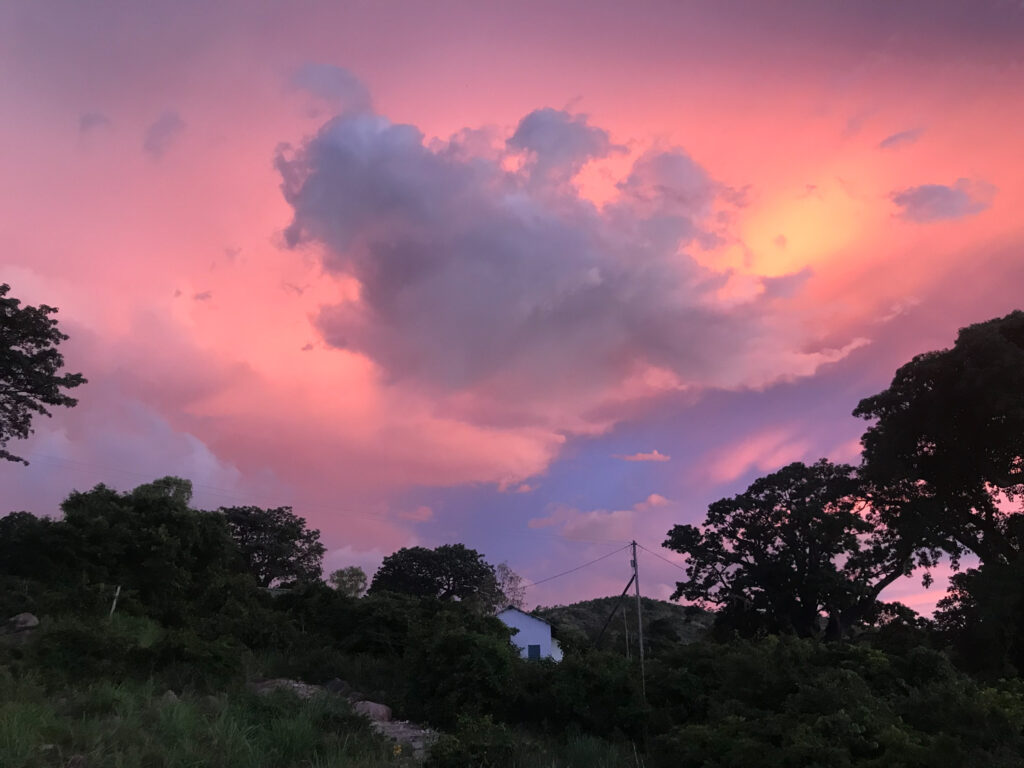
Laurène takes care of one line, Louis the other. The third is held by one of the fishermen. The experience pays off, he alone has caught twice as many small fish as the four of us put together. The sky is rapidly becoming overcast and the storm is lurking on the horizon. It is time to go back, we take the paddle again. We have 19 fish of modest size, the contract is fulfilled. We cook them with a lemon sauce as soon as we get back to the chalet, while the rain is now falling on the island.
The next day it is time to pack up. We walk 45 minutes with our big backpacks and the 16kg kayak. We arrive 2 hours before the ferry. Once on board, it takes several more hours to load and unload goods and people. Seen from the upper deck, it is a nice sight. As it cannot dock on the island, many small boats take turns to the beach.
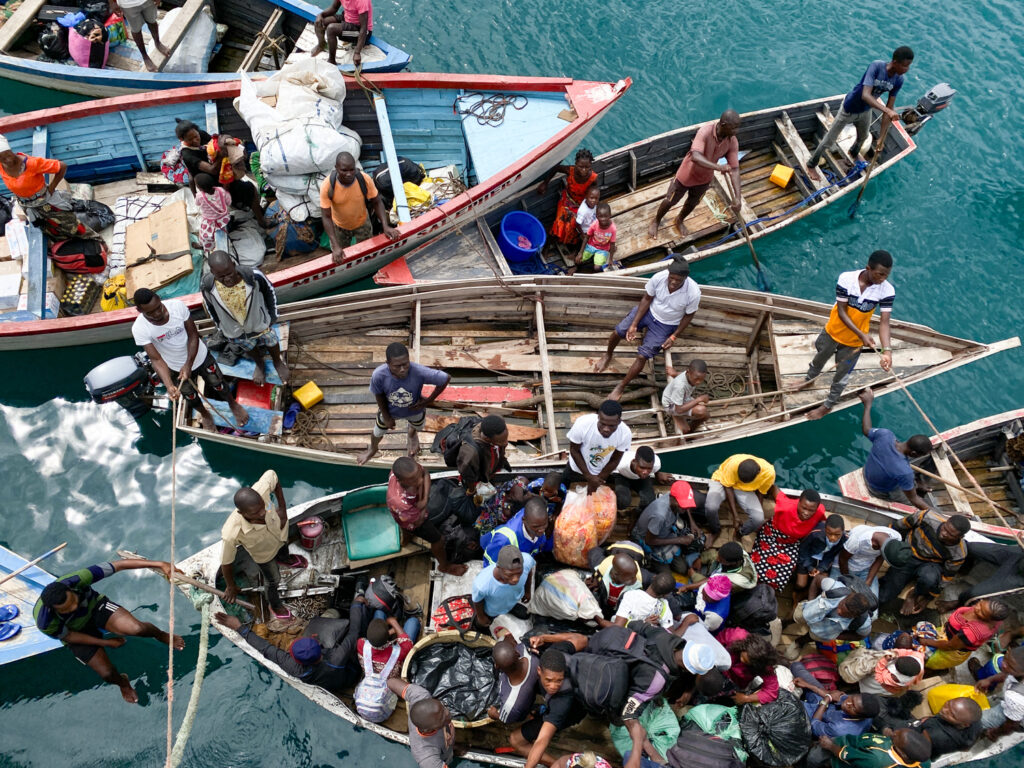
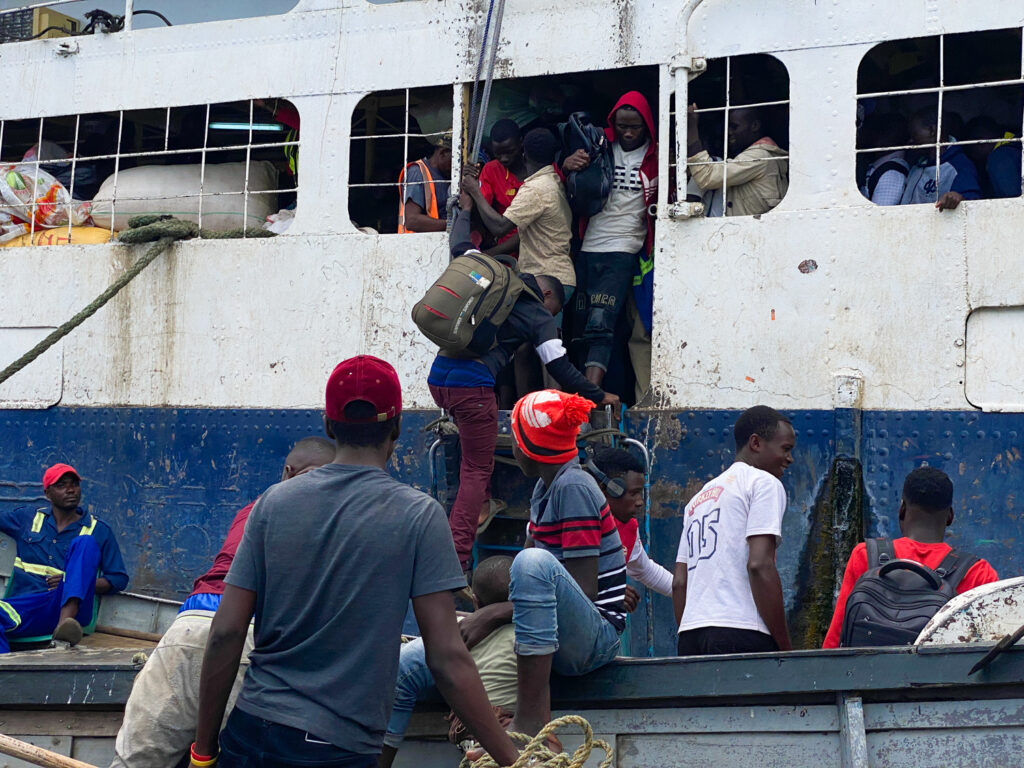
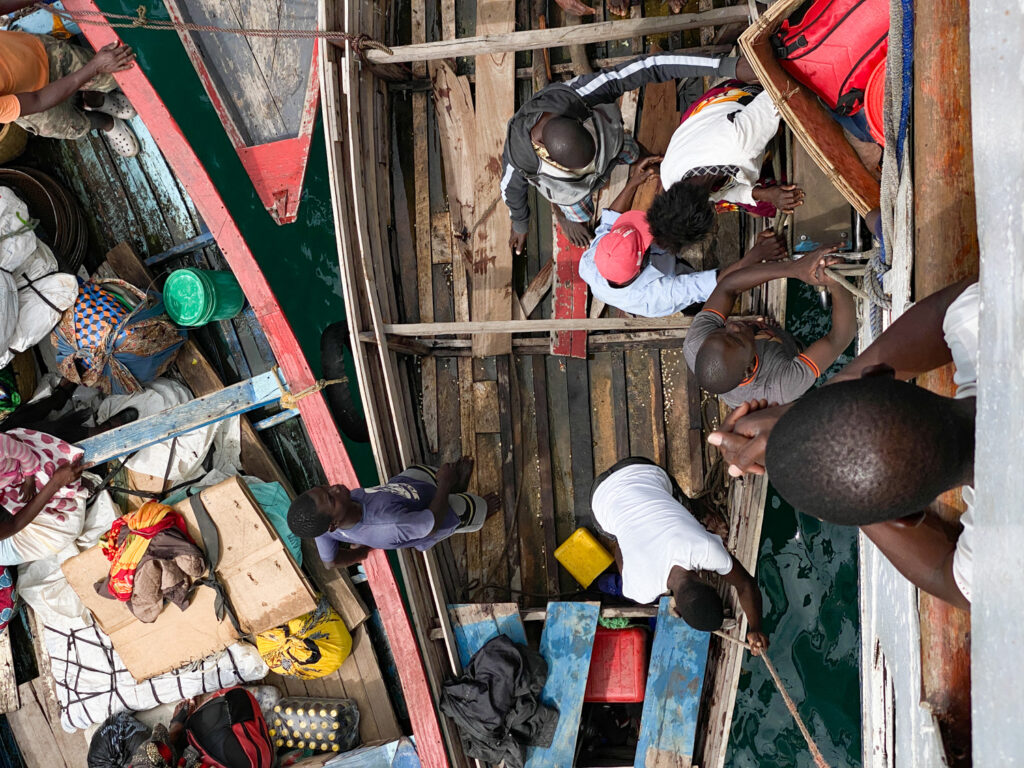
Around 6pm we finally leave. 7 hours later, our friends are just as tired as we are despite their few hours of sleep in a hammock on the deck. But we are happy to be back in our vans and our respective beds.
Meeting associations in Mzuzu
On Monday 7 February at 10am, we meet James at the SMART Center. The SMART Center is an association based in Mzuzu that trains entrepreneurs to build water access points. They specialise in drilling methods and building low-cost water pumps with local materials. As part of our collaboration with the Low Tech Lab, we took a closer look at their activities. We are going to make a video on the subject accompanied by a short article.
We were very well received and finally spent 4 days, 3 nights there. Besides James, the manager of the SMART Center and his colleague Andrew, we met many people. A young Dutch couple was working temporarily for this association.
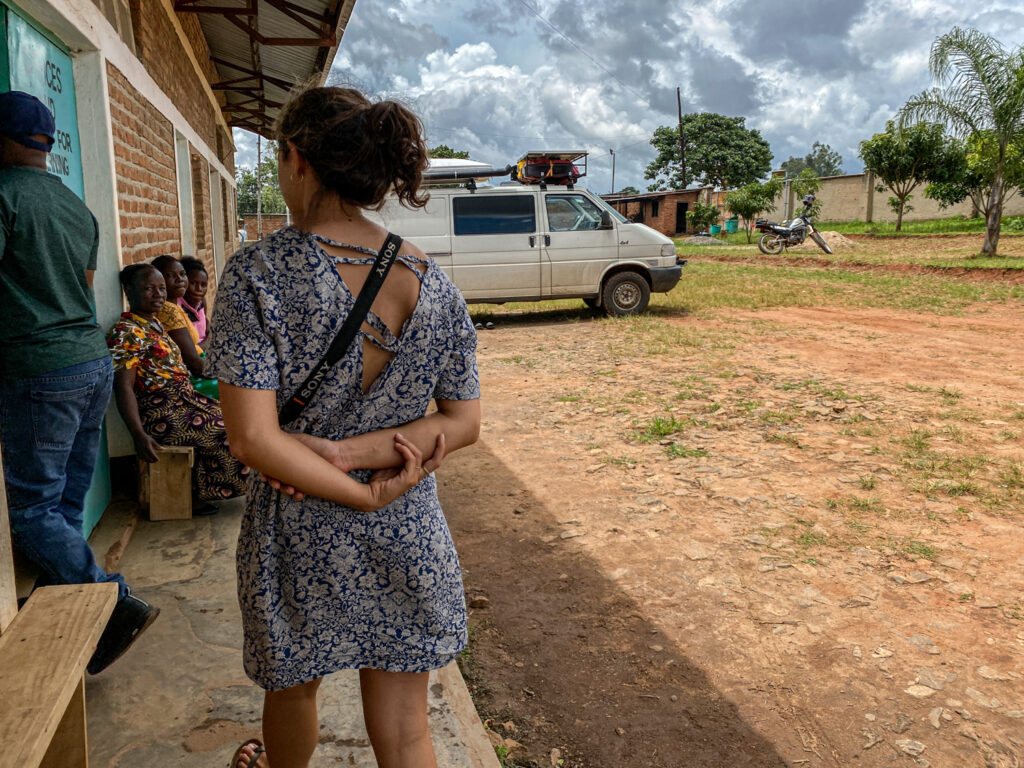
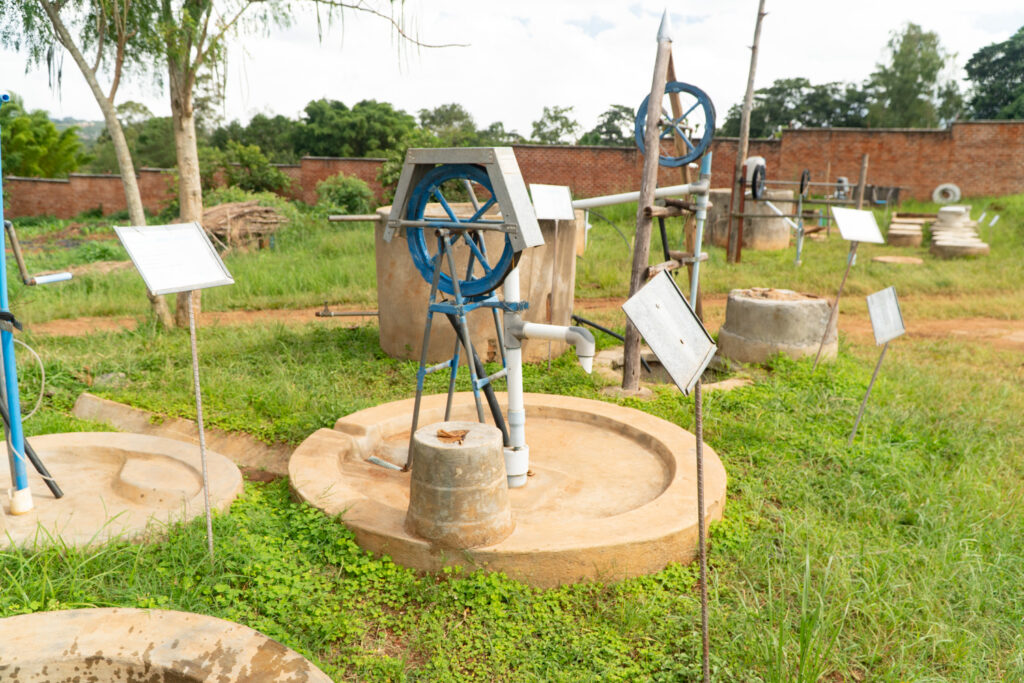
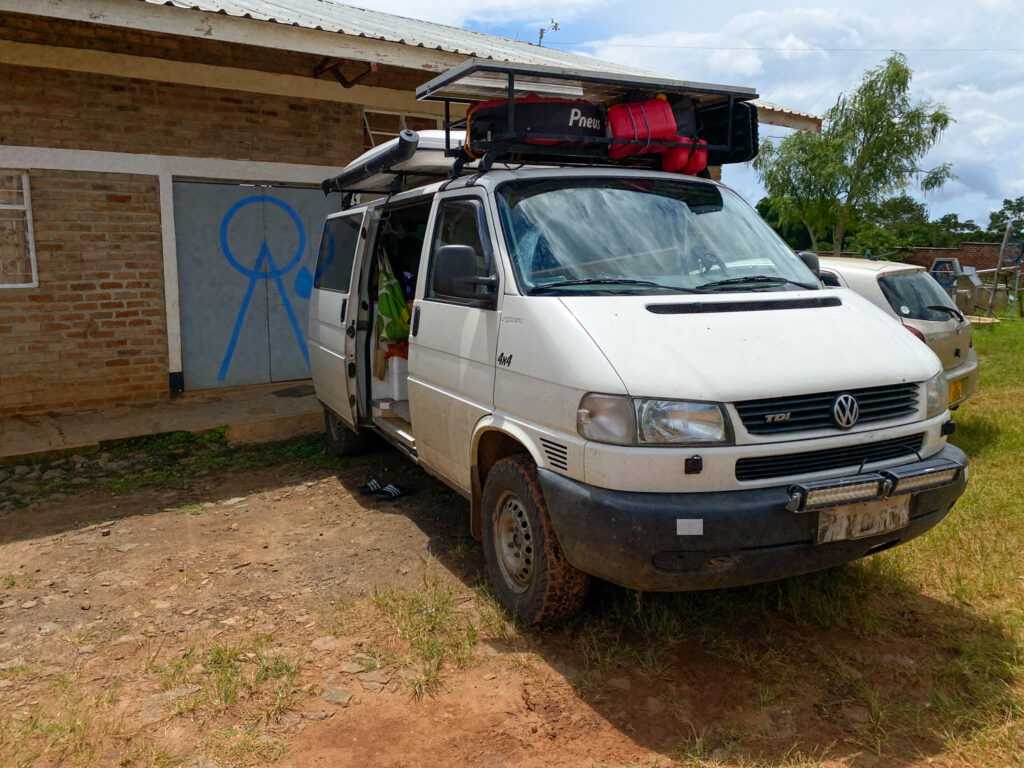
The next door in the same building houses another association “wheel for Zoë” run by Rose and her team. It was also a great discovery. They are very active in 3 areas:
- Water pumps construction and installation
- Planting trees for reforestation
- Education of women who have not had the opportunity or money to continue their studies.
We will talk about this in more detail in a specific article in our “Association Focus” section

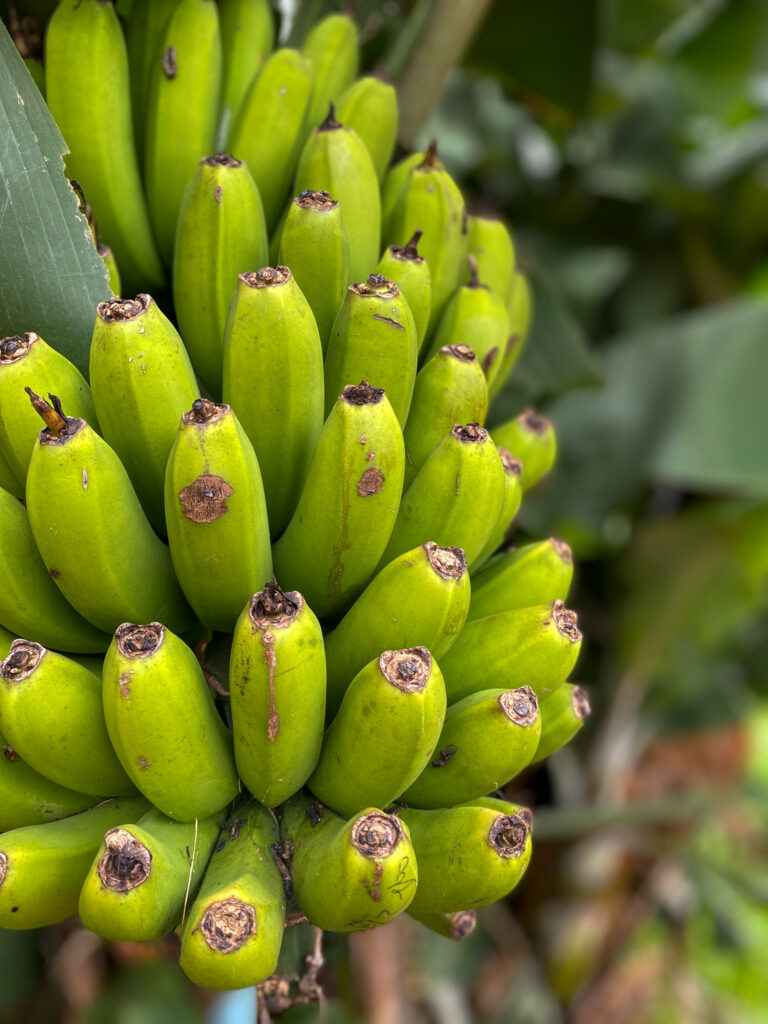
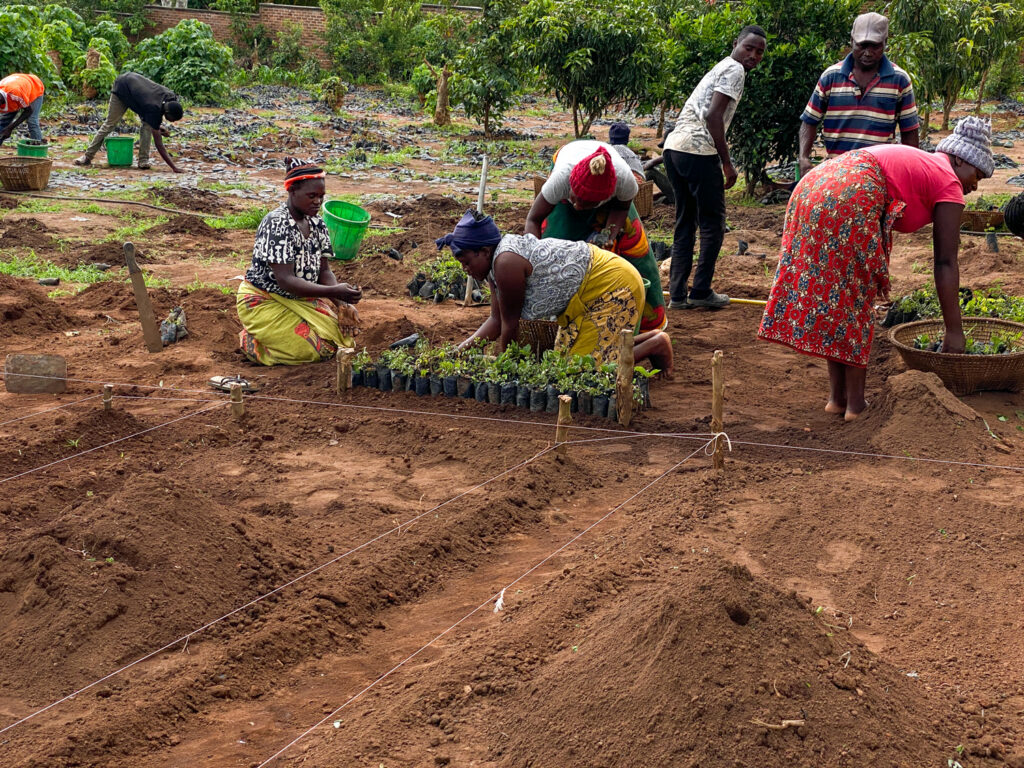
After 5pm, the staff of the two associations go home. Rose, who manages the site, comes every day to wish us a good evening and to make sure that everything goes well for us. Menno and Janke, the Dutch, sleep on site at the SMART Center. So we spend our evenings together sharing our stories in Africa over a beer and a meal.
One evening, they take us to the local bar. During the week it is not crowded. In fact, we were the only customers before 3 Malawians joined us. They are very sociable and come to introduce themselves: Grant the big talker, Steve the youngest and Idrisse who runs a tyre shop. They are happy to meet us and offer us beer after beer. Idrisse connects to the bar’s loudspeaker to make us dance to his best music. The evening doesn’t last long, everybody works tomorrow, except us, even if we are quite busy these days.
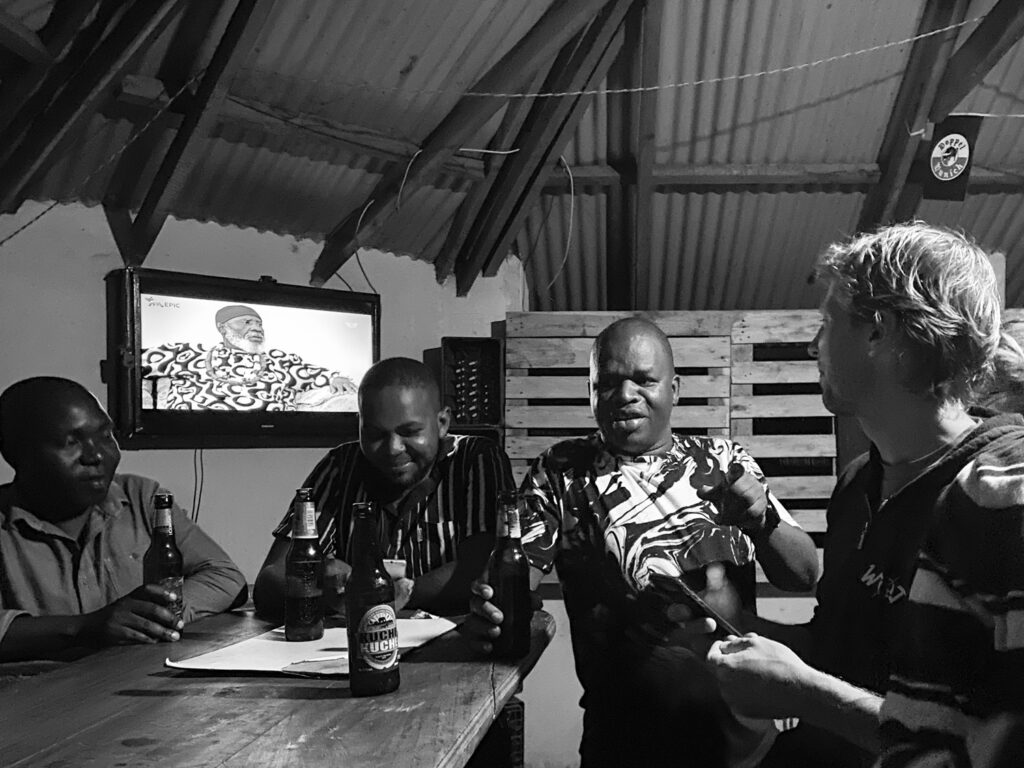
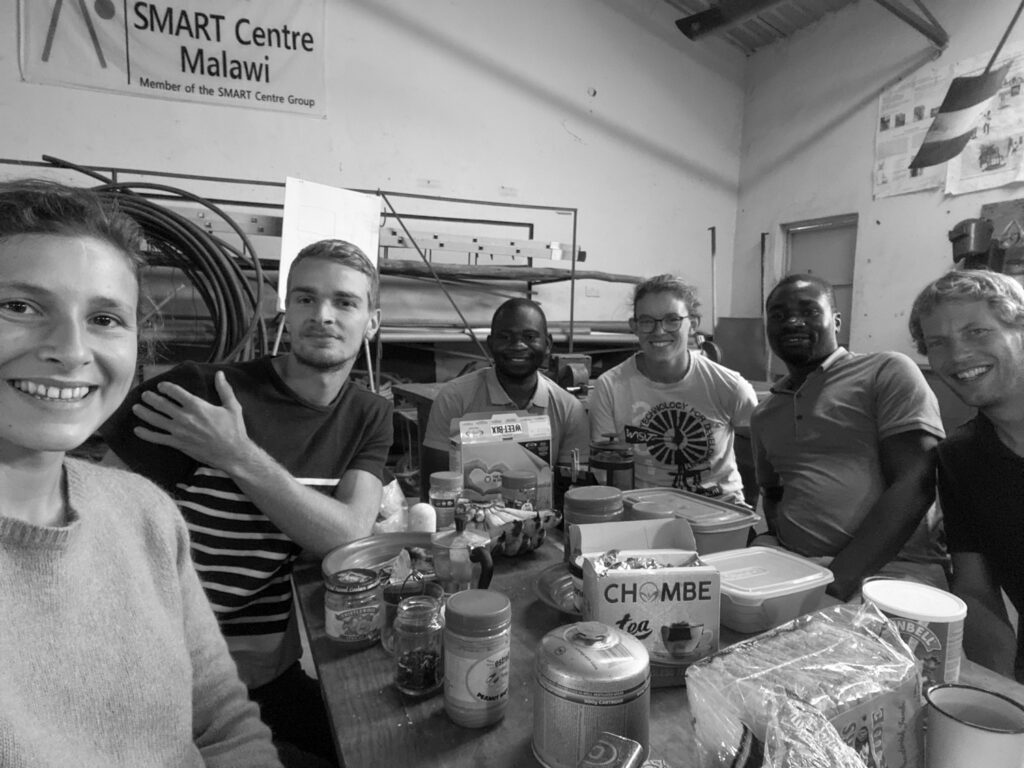
Before leaving the smart centre, we all share a lunch together. James has just become a father. He and his wife have each chosen a name for their son which will be his two main names. This is the tradition in Malawi. Then the aunts and uncles also give the child the names of their choice. As the child grows up, he or she will be able to choose the usual one.
Andrew is a great talker and has many stories to tell. When he was a child, he used to hunt rats and birds with traps he made with his friends. The captured animal would end up fried in oil. There is not much to eat on it, the pleasure was more in the capture of the animal.
When it’s time for coffee, he makes himself a big cup of hot water and adds a few drops of coffee. Just for colour as he says. In Malawi this is how they drink it. An espresso is considered a waste of coffee, an expensive commodity.
A mountain getaway at the Mushroom Farm
Thursday, the sun returns after a few days of showers. We take the opportunity to drive to the Mushroom Farm.
Located in the mountains on the edge of a cliff, it has a permaculture garden, small cottages, a restaurant and camping sites. The place has a good reputation, all the travellers we met on the road told us about it. It is also where the more prosperous locals bring their wives. Couples’ outings take place in trendy places where the wife can take a photo for social networks.
The restaurant offers exceptional food made with freshly picked produce from the permaculture garden. If that’s not enough, the breathtaking view of the valley, Lake Malawi and the surrounding mountains will convince you.
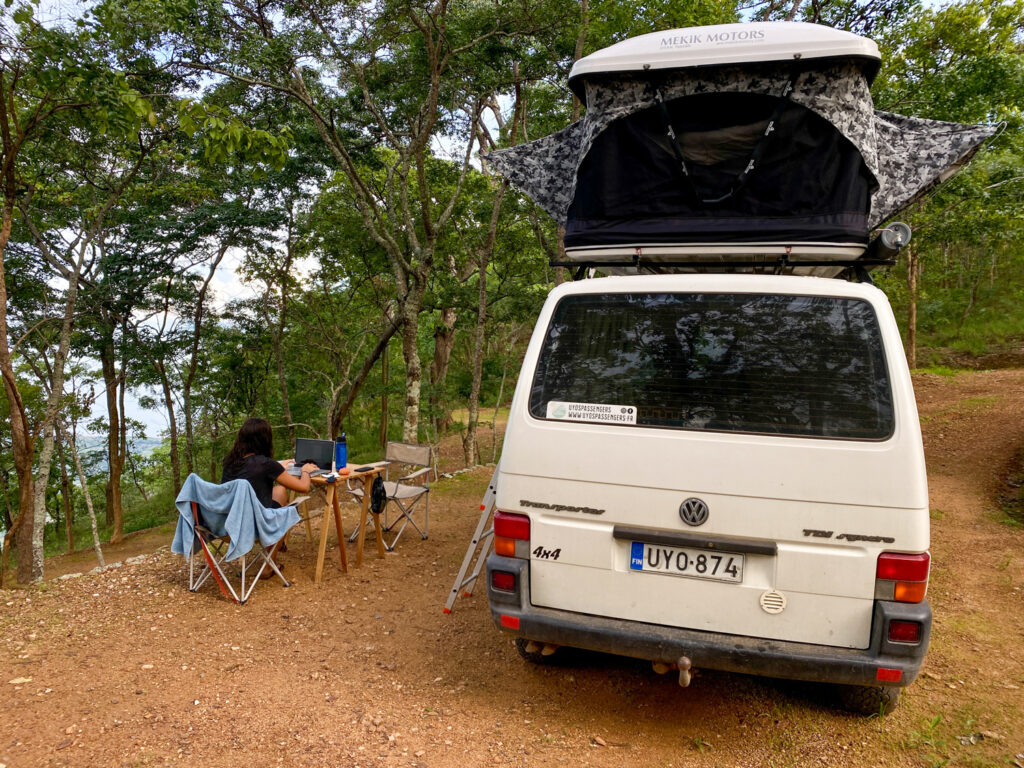
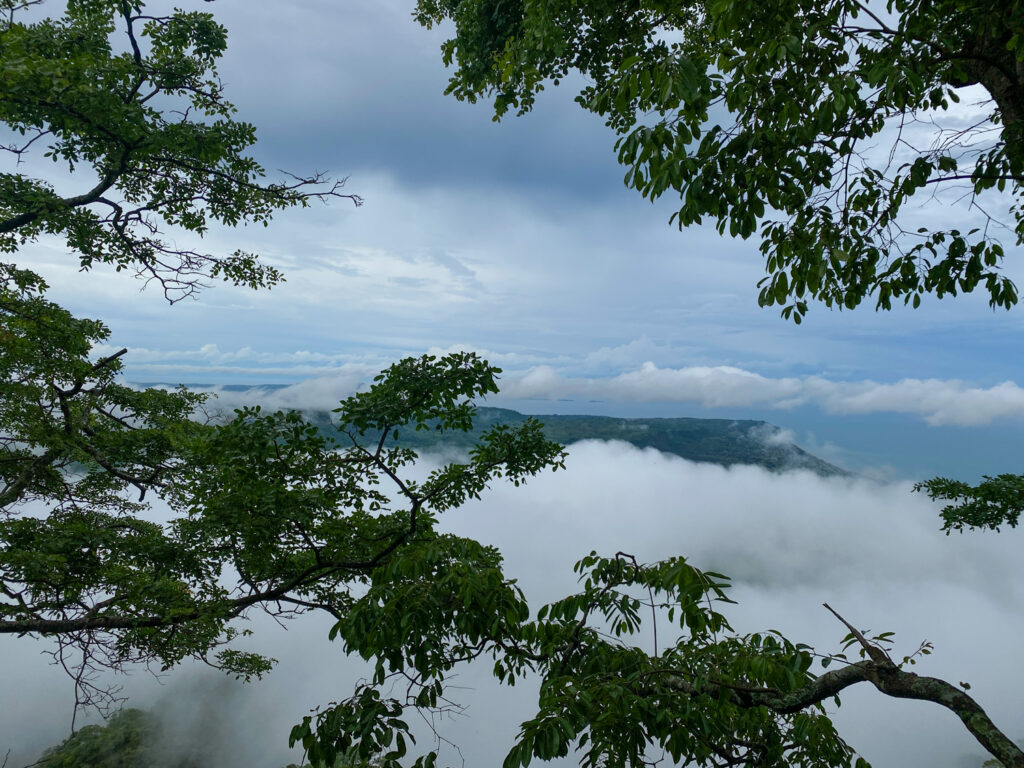
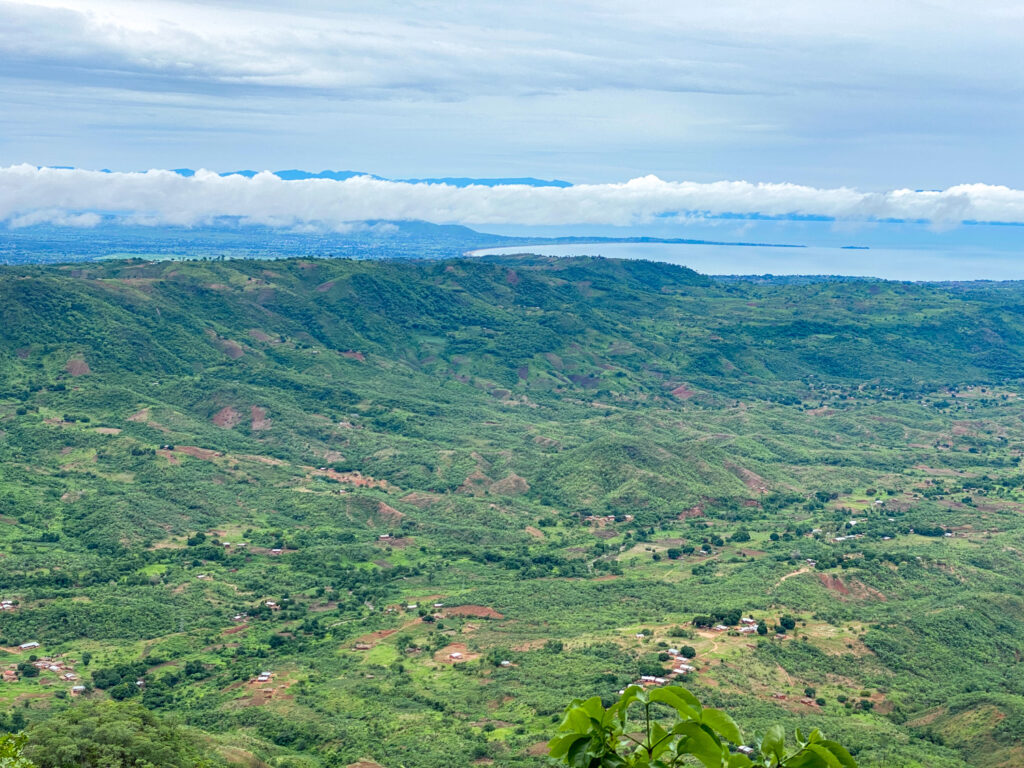
There is a mystical atmosphere as the fog moves rapidly along the cliff and consequently into the middle of the establishment. A sheltered platform plunges into the void. Indicated as a yoga spot, we take advantage of it twice, combining yoga and weight training.
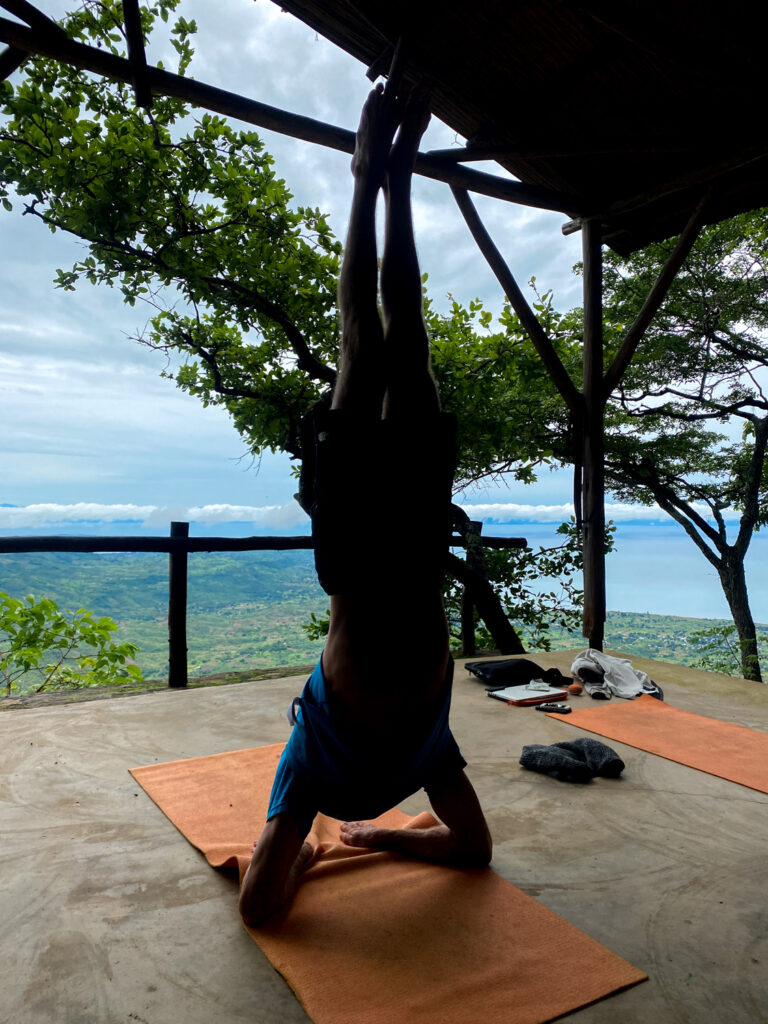
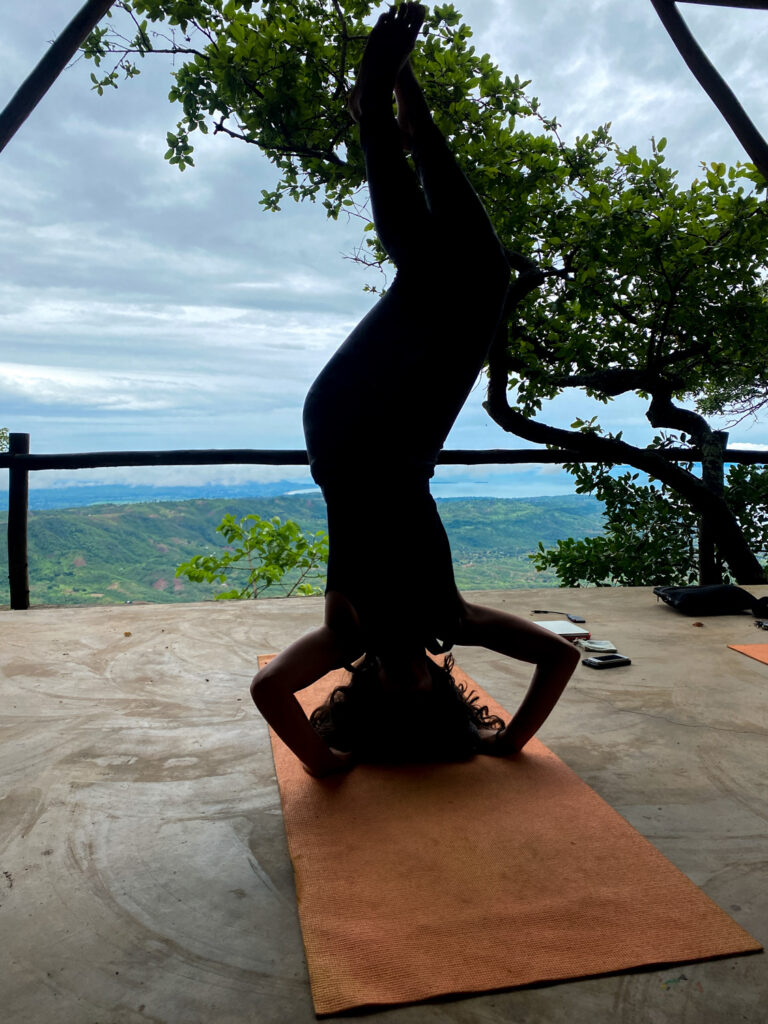
On the second day, we visit the permaculture garden under the explanations of Tsulani. He is very educational and takes the time to explain the concept of permaculture, its ethics, its principles and its application. Before going into detail, he invites us to sit down and encourages us to speak. He wants to hear what we know about permaculture. Valentin starts shyly, then Laurène continues and gradually our memories come back. We take turns recounting our knowledge of the online permaculture course we took two or three years ago. Tsulani is pleasantly surprised to know that we have been initiated. He takes us on a tour of the garden, illustrating the application of permaculture.
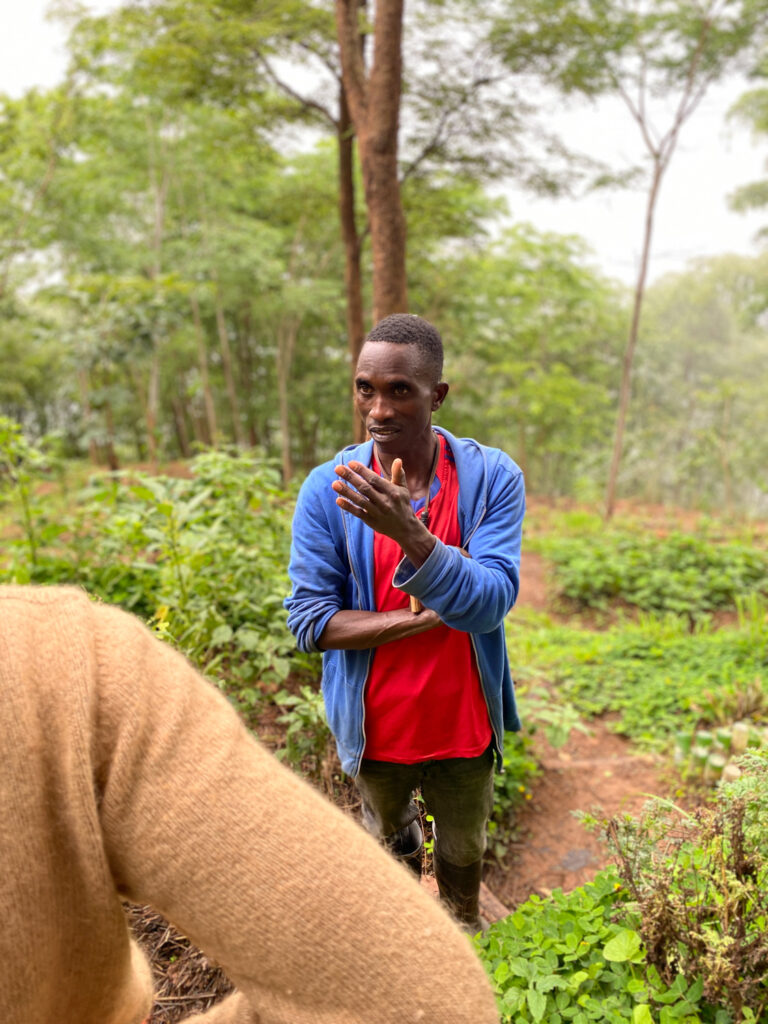
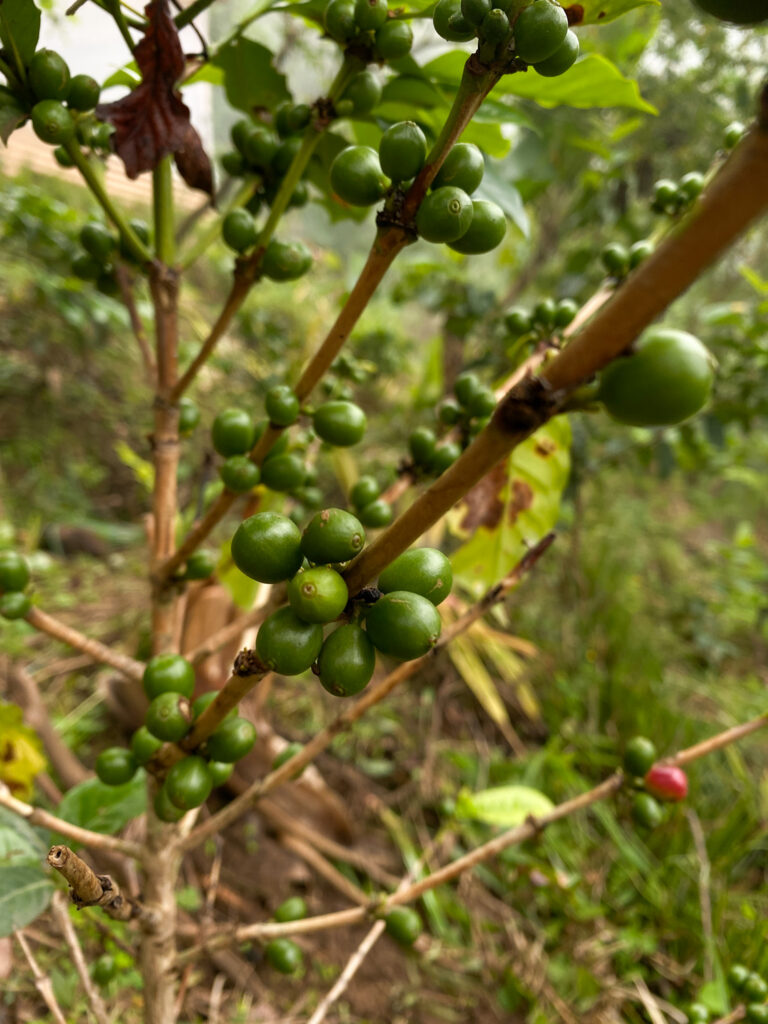
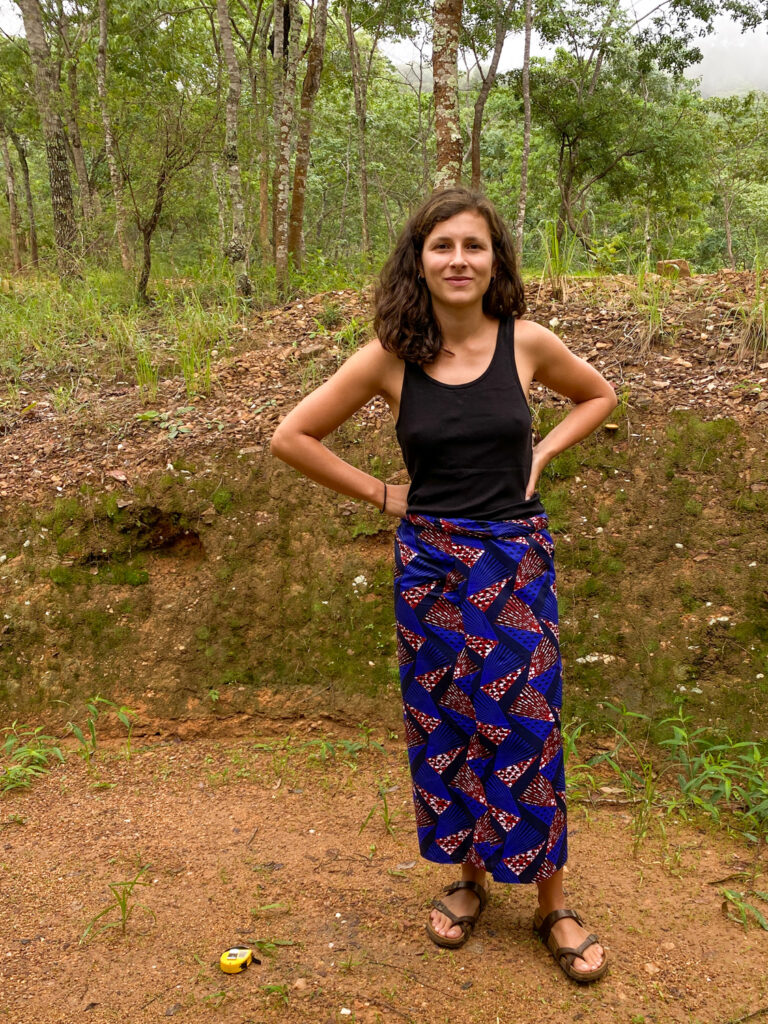
To name just a few examples and principles. In permaculture, we are inspired by nature by copying its solutions. Thus we find the protectors, varieties of plants, edible or not, which will protect the crops from pests.
The resources used are local and each element has several functions like a Swiss knife. For example, the pigs’ shelter collects rainwater from the roof and also the animals’ urine, which is a very good fertiliser. The animals themselves are fed by the peelings and plants from the garden.
Everything is designed according to a sustainable and virtuous cycle that is self-sufficient. In the greenhouse, next to the young shoots, seeds from the previous harvest are drying to make new seedlings and feed the next harvest. In the evening, we enjoy lentil dahl with eggplants fritters and salad from the garden.
The next day we go for a walk to the waterfall a few kilometres away. According to the locals it is the biggest in Malawi. We arrive at a first viewpoint far enough away to appreciate the extent of it. Unfortunately for us, the view is blocked by a thick white mist. We wait a while and finally see the waterfall through the thinning clouds before it comes back again. We continue the hike to approach the waterfall from behind. The view is beautiful through the curtain of water that goes on and on.
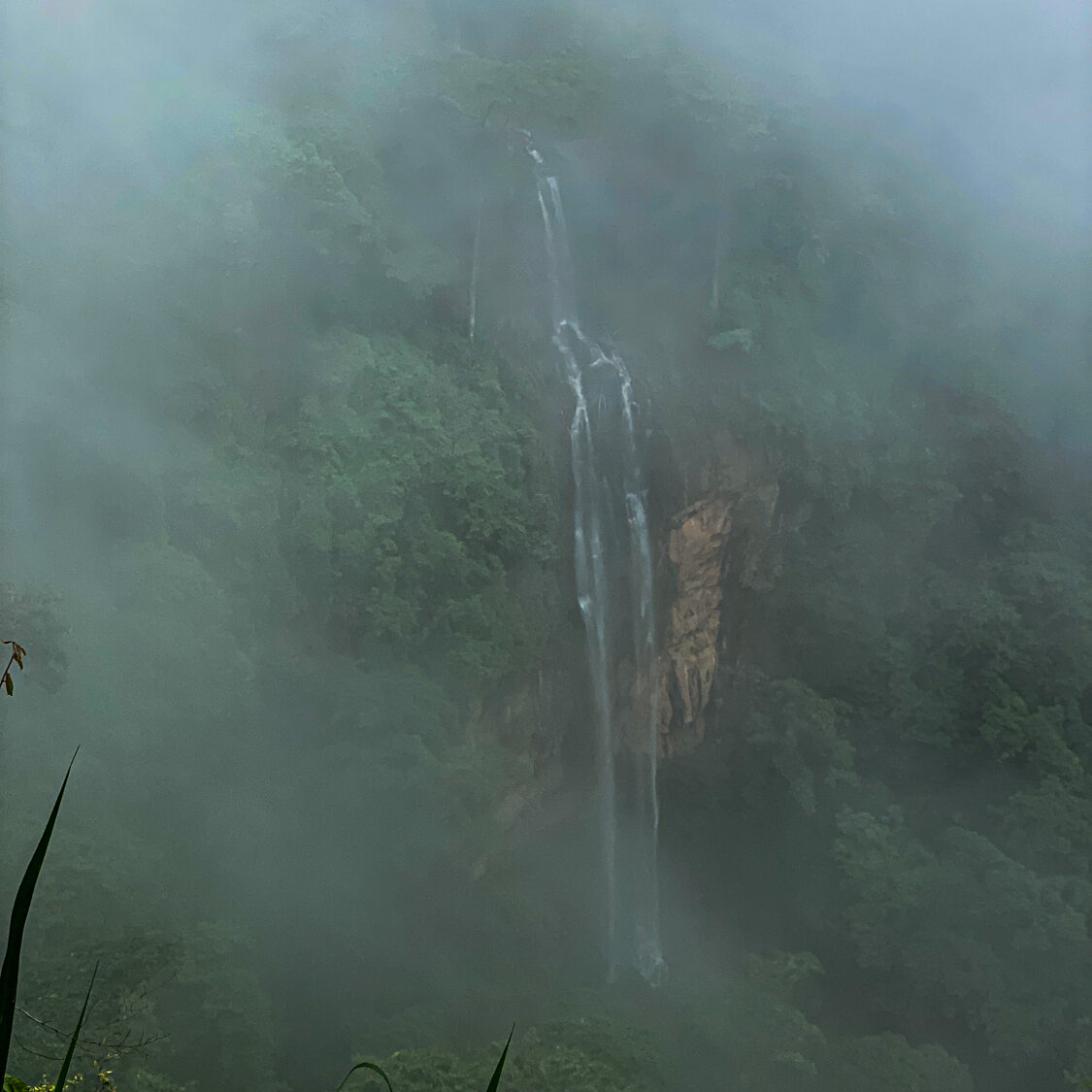
We stay one more day at the Mushroom Farm because it feels good, the setting is beautiful and relaxing and we met some very nice travellers. Moreover, we heard about an artisanal jewellery shop at 30min walk from the farm. This one only opens on weekdays and tomorrow is Monday.
We discover a large workshop with 10 people working on beautiful jewellery. The company, launched in 2018 by an American couple, trains and employs several locals to make and sell the jewellery. They are now working on a new collection with stones from Malawi. Four people were in training to learn how to use the new machines to cut the stones. We leave with two beautiful pieces of jewellery and prepare to take the road to the lake. It’s a 10km 4×4 road with hairpin bends. We’re glad it’s not raining today because we’re not ready to repeat the South African experience (Episode 3 | Our first 4×4 experience ends up in the garage)

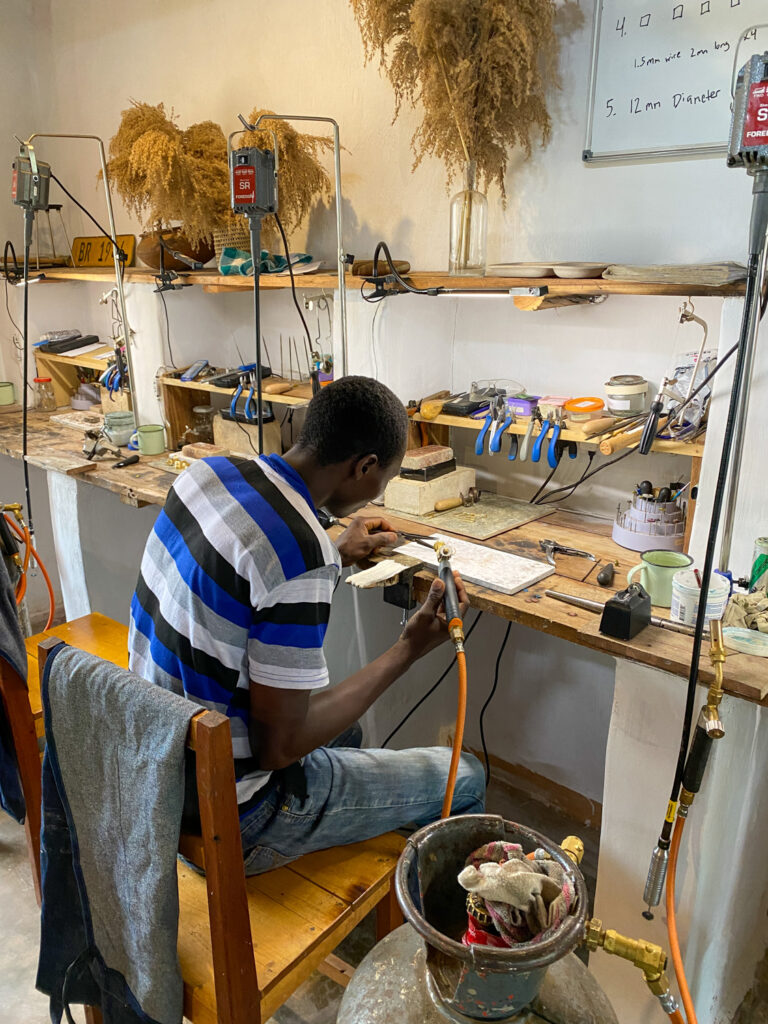
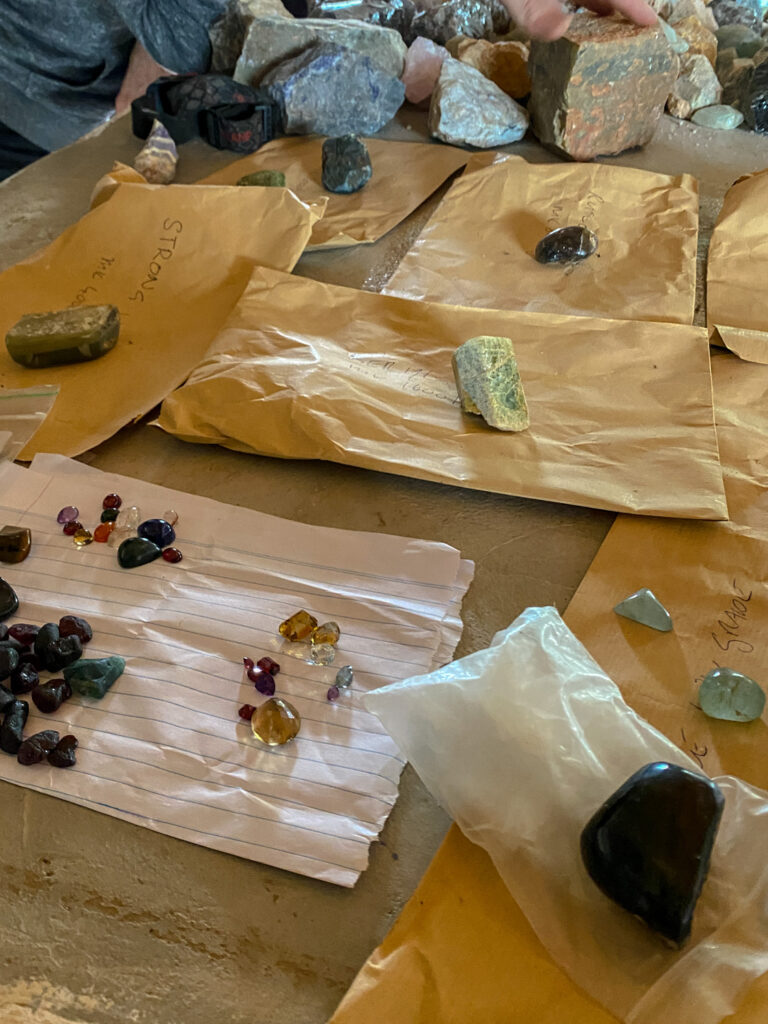
Back to the lake in the village of Chilumba
Today is Valentine’s Day. To celebrate my day and especially our love, we’re cooking a nice meal. I had the idea to make homemade gyozas. On the road, we bought mushrooms from the mountains, leafy vegetables, like spinach, and ginger for the garnish. We set up camp near the lake at Thunduzi beach, a bar-camp run by Alfred, a Malawian from the next village.
We are the only tourists, since the covid crisis, he doesn’t receive many people. At the moment, he welcomes students to the camp so that they can study in a favourable environment. This Monday, for Valentine’s Day, many people from the village meet at the bar and come to the beach. It’s a busy time!
As soon as we settled in, a man undressed to bathe in the lake, then he soaped himself and got dressed again. An hour later, we understand that it is Alfred the owner of the place. He informs us that the students have the habit to wash themselves in the lake in front of the place. Indeed, it’s quite a parade of young men who take off their clothes to wash themselves in the lake. To leave them some intimacy, we stay in our van to finalize our first video on Malawi. The time comes to cook, and there is work. We have to make the dough, to spread it very thinly and to prepare the filling to then roll our gyozas before cooking them. We cook outside and people come to see us, especially young people. They introduce themselves, ask us some questions about what we do and ask if we can be friends.
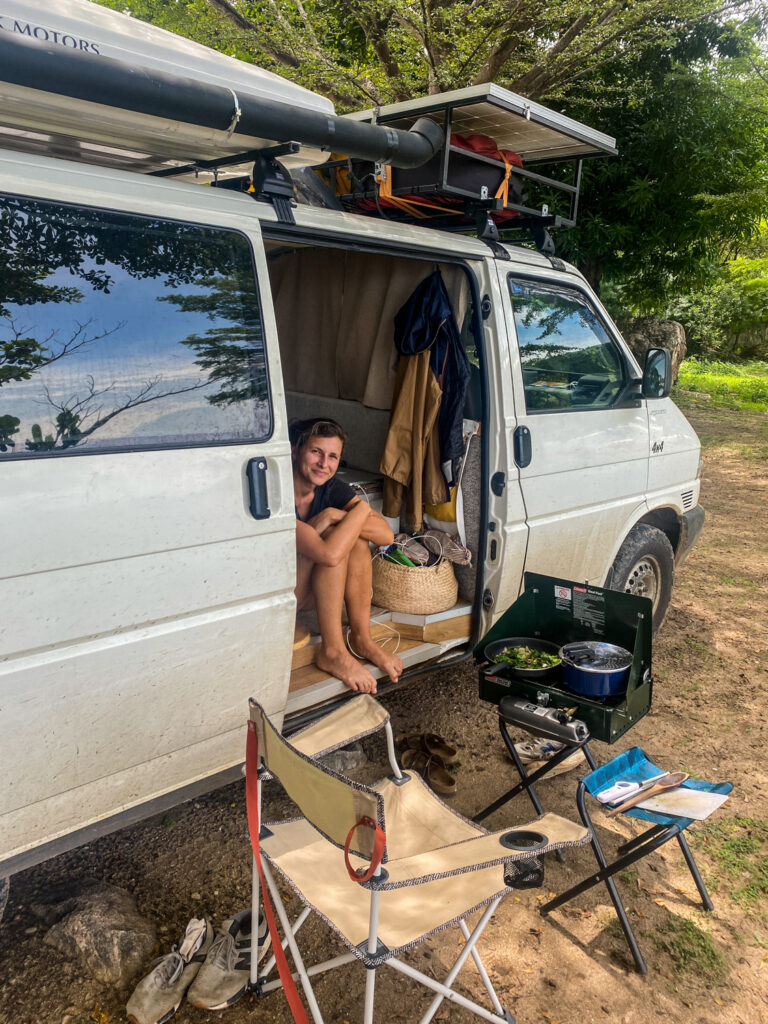
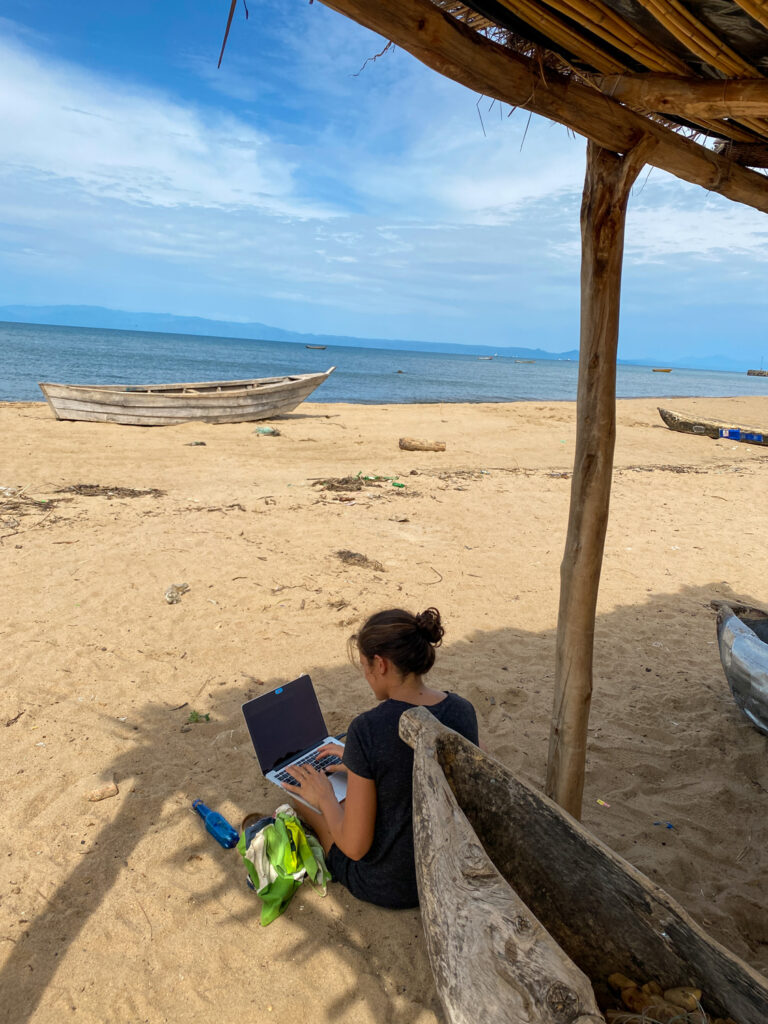
The night falls little by little, a man of passage asks us if we can give him a bit of our meal. We explain him nicely that it is not ready and that we planned the quantities for two. We propose him all the same to taste our filling. At the same time, it begins to rain. We move the things in the van. The man left quickly without more insisting or emitting a compliment on our food.
We go back to the kitchen. A few minutes later Valentin looks for his phone. We used it while cooking to take pictures. Laurène put all the stuff in the back when it started to rain. I search but nothing. We both start to search more deeply considering the idea that it could have been stolen. It remains untraceable. We start to doubt. The last guy left very quickly and with the rain we paid less attention to our things. On one hand, we hesitate to go to the bar to report a theft to the managers of the camp. On the other hand, we also hesitate to look for a little more. We don’t want to accuse someone wrongly. But if it is the case, we should not lose too much time. It’s already been 15 minutes.
We go towards the bar, Valentin a flashlight in the hand in the hope to find this guy and to question him. I spot a guy wearing a red and blue striped polo shirt. “It’s him, isn’t it?” I said to Laurène, shining my flashlight on him. Neither one nor two, the guy runs away without even being able to approach him. No more doubt, his reaction sounds like an admission. Then follows a crazy pursuit in the direction of the village and the beach. I run after him, the flashlight pointed on him while shouting that he stole my cell phone.
The barman followed, then a young fisherman crossed on the beach. We follow him in the trace by gaining ground. The guy runs out of breath little by little. Suddenly, he disappears. Apparently, he would have hidden himself. I give my lamp to the barman who knows better the places. We look in a tree, nothing. Behind a pile of wood, still nothing. When finally, I hear the barman shouting near a low wall. He found him lying behind and threatens him to throw a brick in his face. I run over, and see that he gets rid of my phone by hiding it in a slot along the wall. I get it back, what a relief! In the meantime, all the neighborhood had gathered, as well as Laurène who had followed the noises. Then follows a long verbal altercation that we do not understand. I see in the eyes of the culprit that he is not in his normal state. He has had a few too many drinks, bringing out his bad side. I ask him to apologise but he doesn’t seem to understand with all these people shouting at him too.
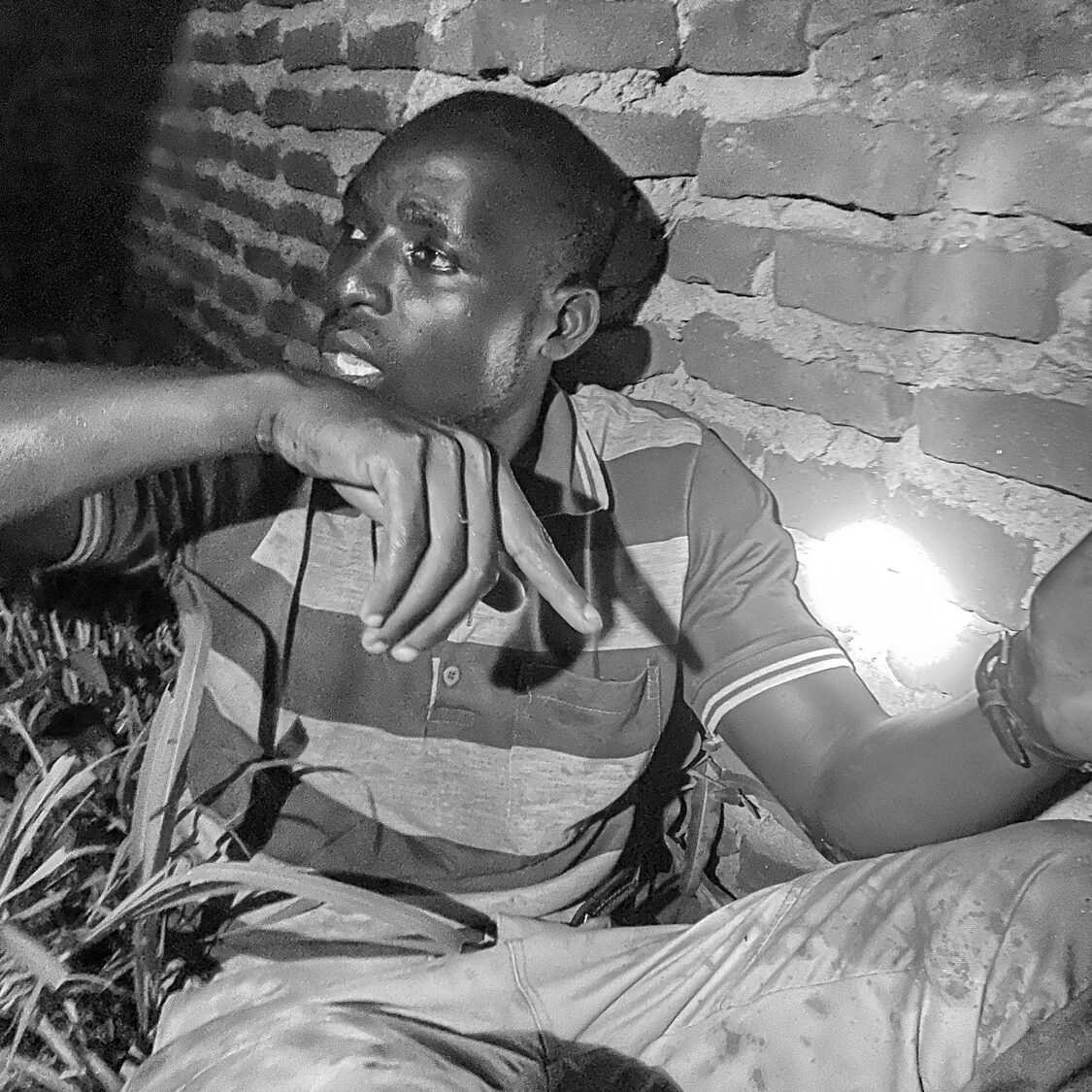
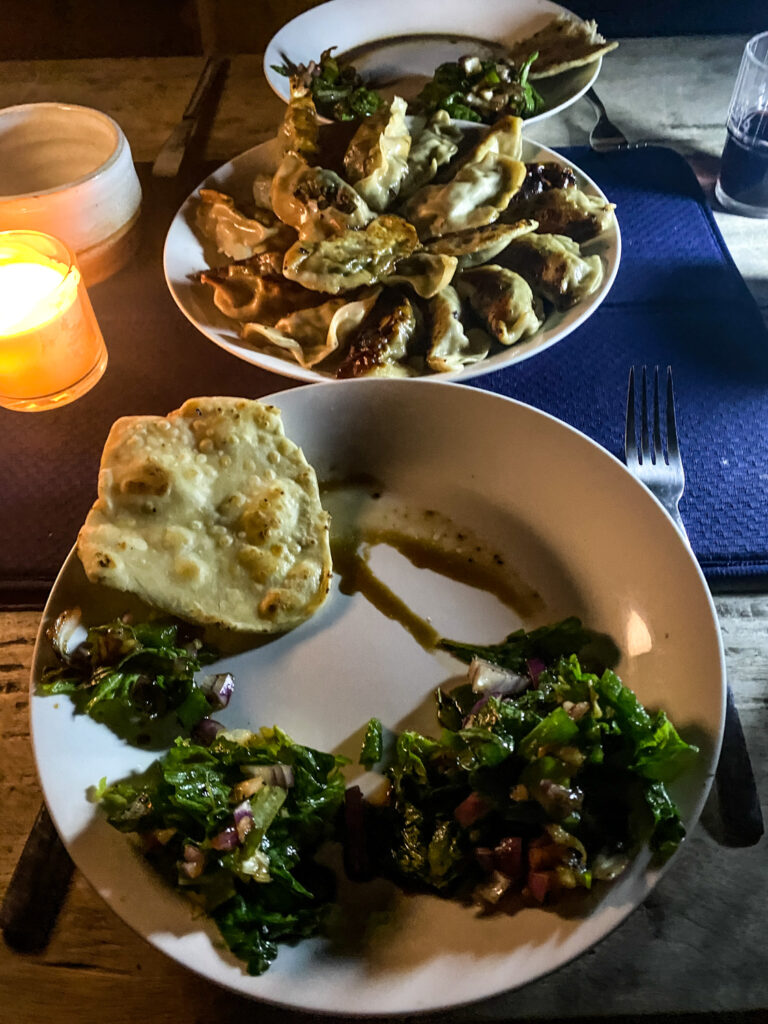
Anyway, we recovered the phone. We do not stay more, the gyozas are waiting for us. Moreover it was a delight which makes us forget quickly this misadventure which finishes well.
We will finish the evening in the bar, much less animated a bit before midnight. We discuss with the last customer, a man who manages a farm in 1 hour of road of here. He appreciates our company and makes it known by offering us a beer. We feel that he wants to continue this conversation about on the education and the work in Malawi.
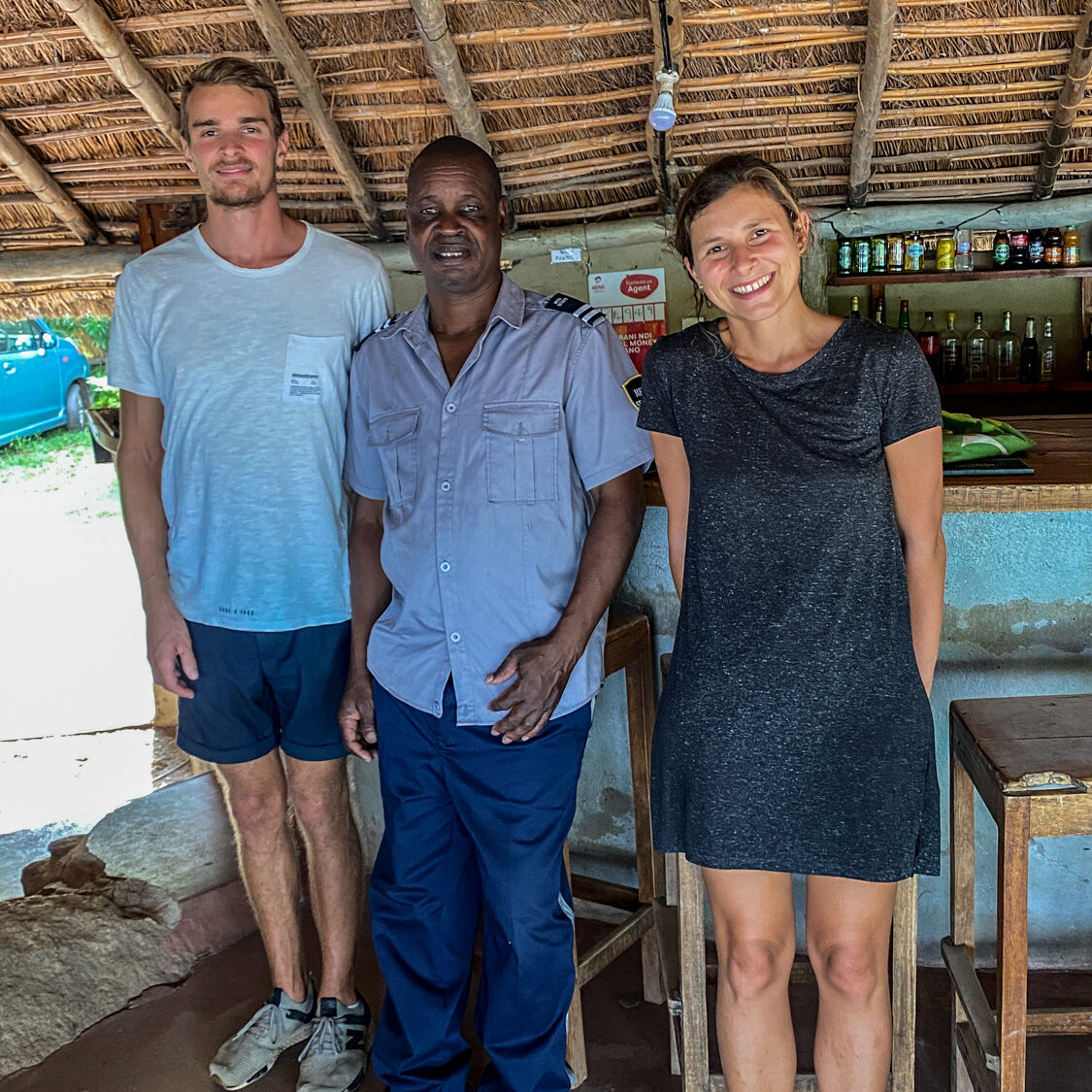
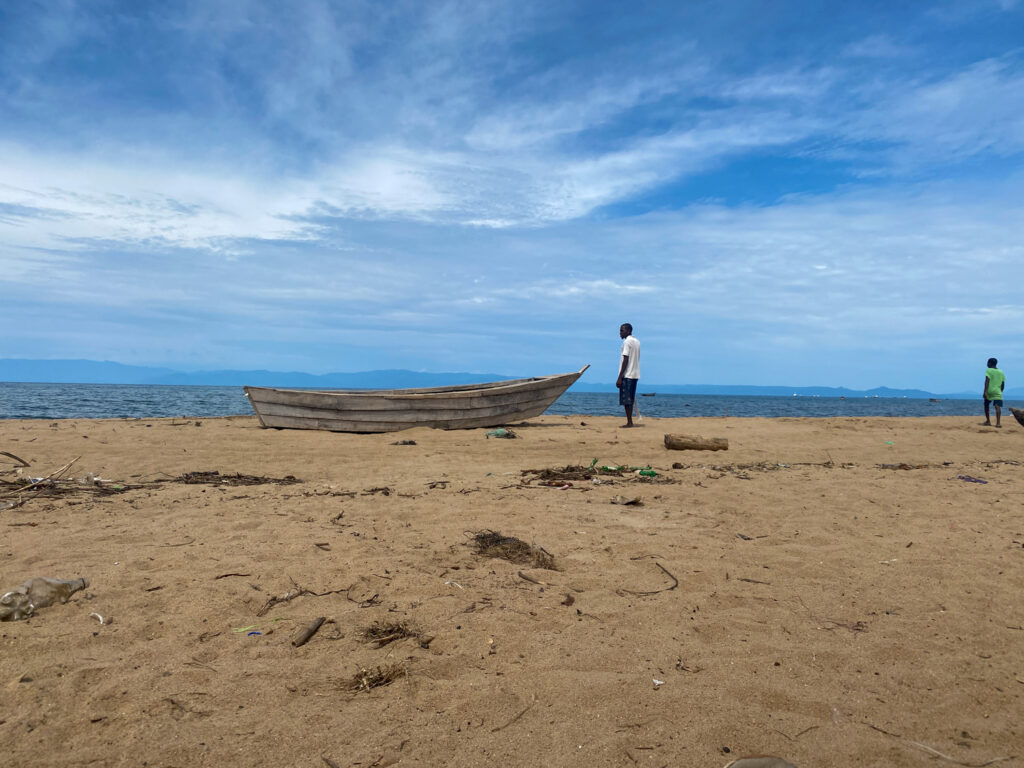
The next day we decide to stay one more night. In spite of the small incident of the day before, we feel well here, near the lake. We take advantage of it to rest before our entry in Tanzania. The crossings of land borders are always a little stressful. We never really know what to expect even after the feedbacks of other travellers passed the previous weeks. Each one had a different experience.
See you soon for the next adventure on the Tanzanian territory!




A Very nice read, I wish to travel through Europe as you have through Africa and my home Malawi.
Pingback: #12 Beautiful beaches, kite surfing and snorkelling on the island of Zanzibar